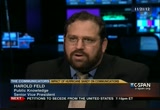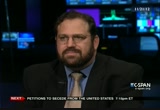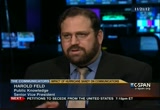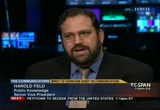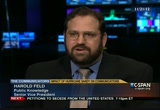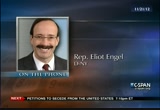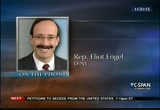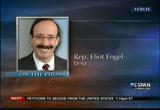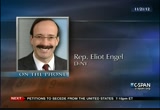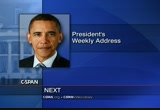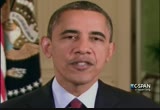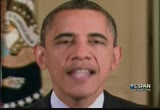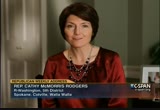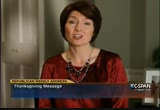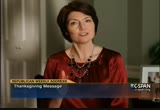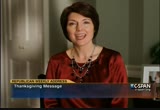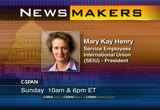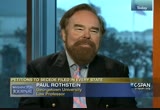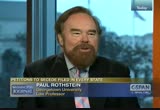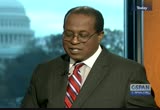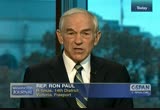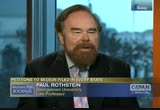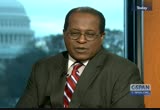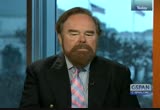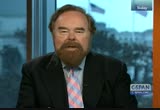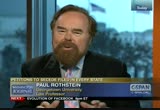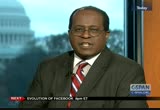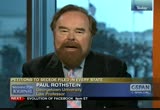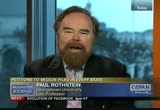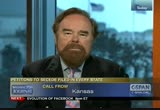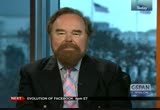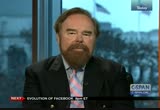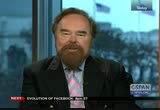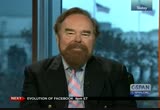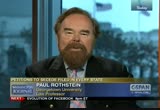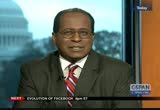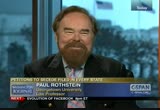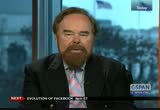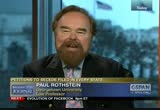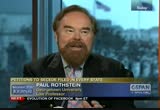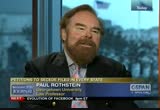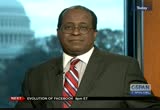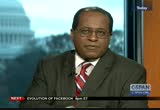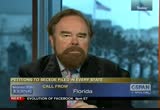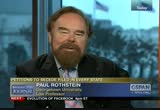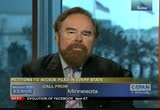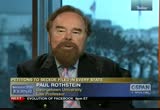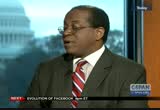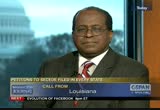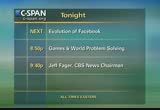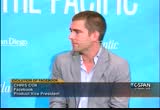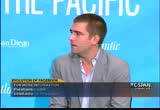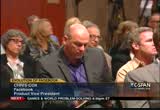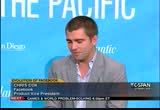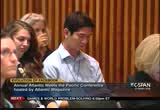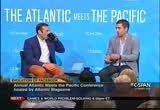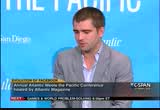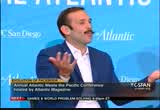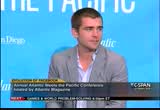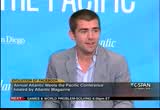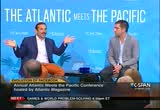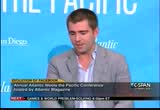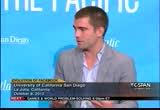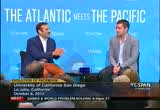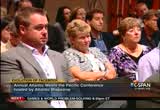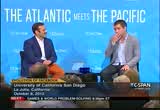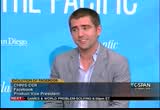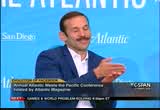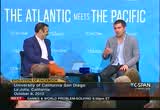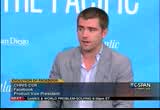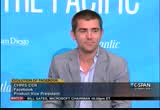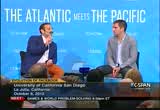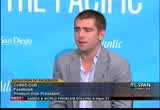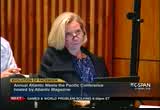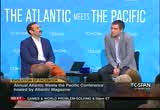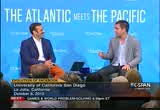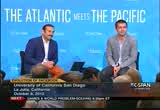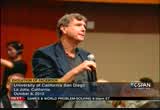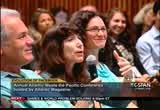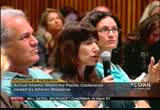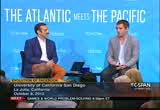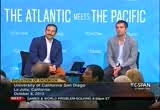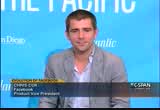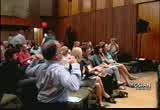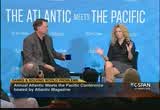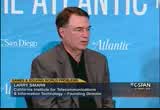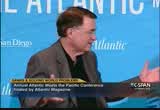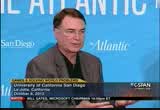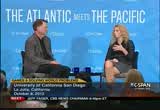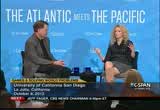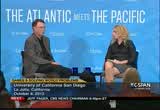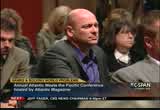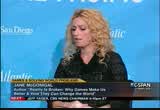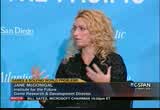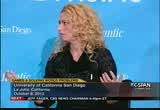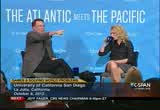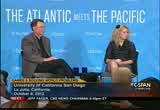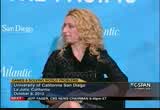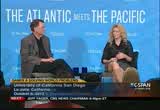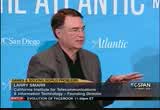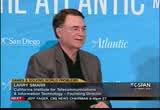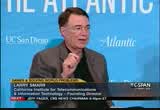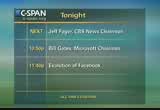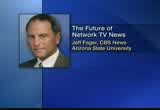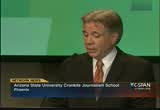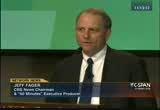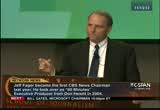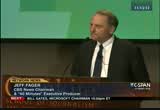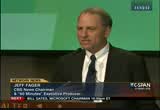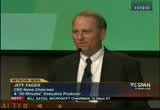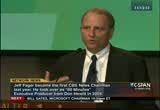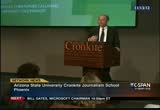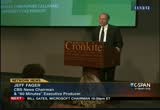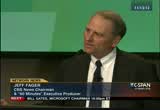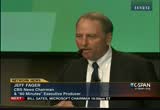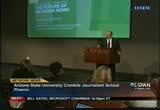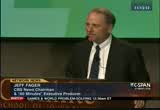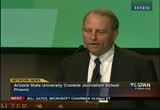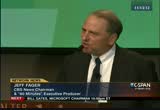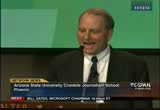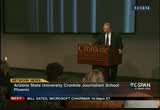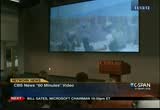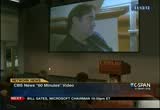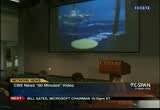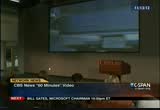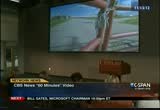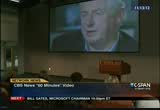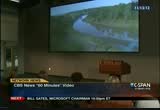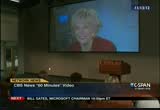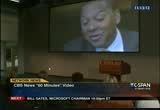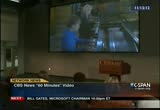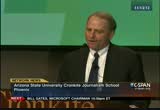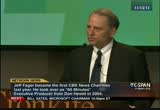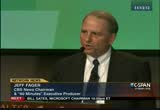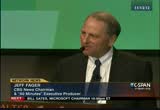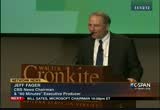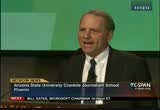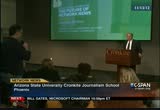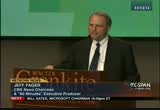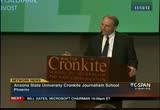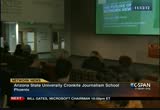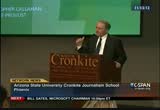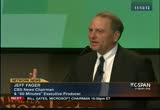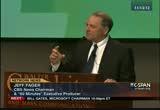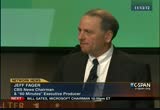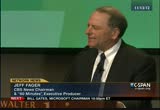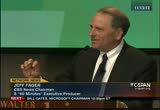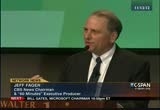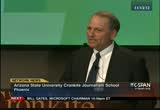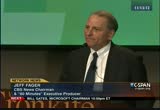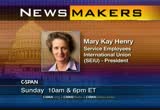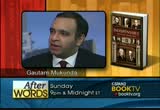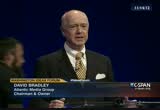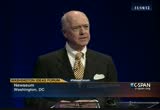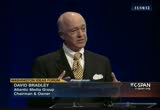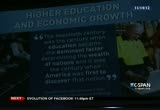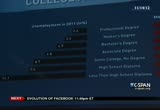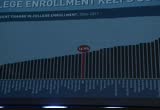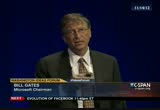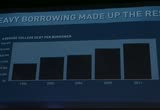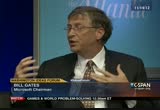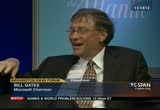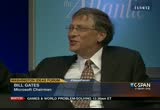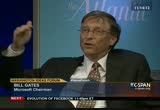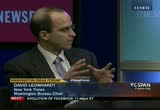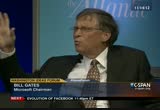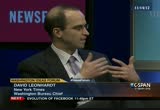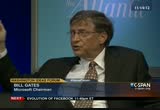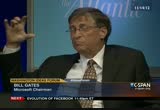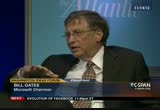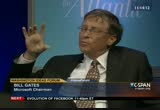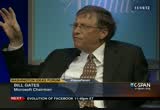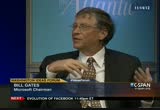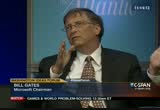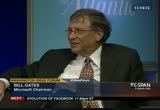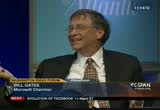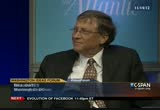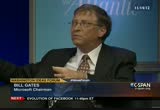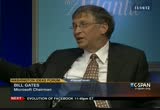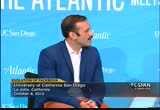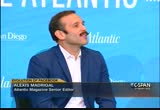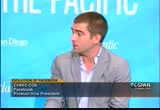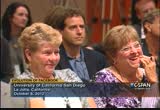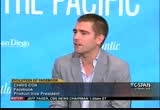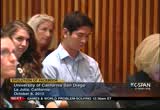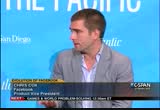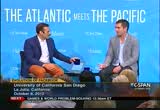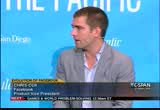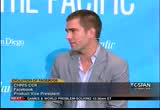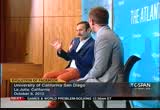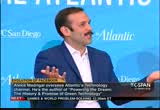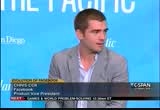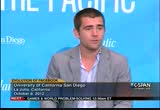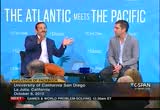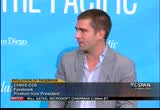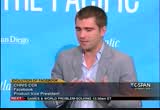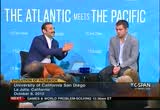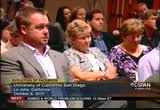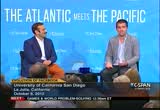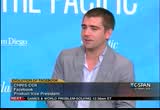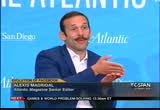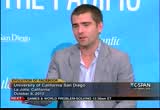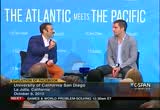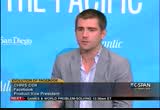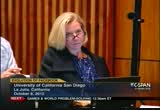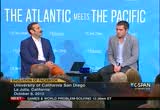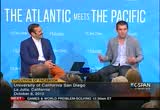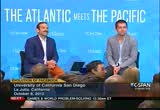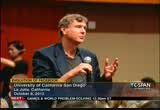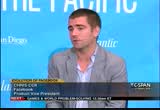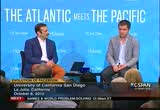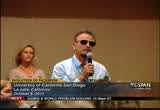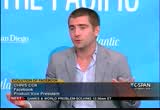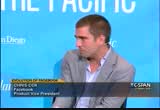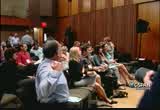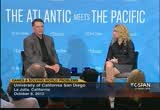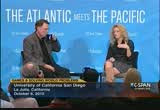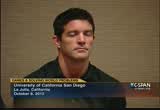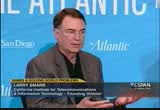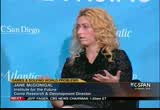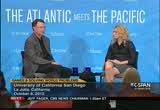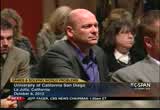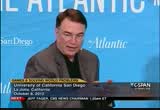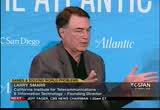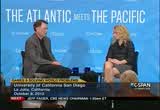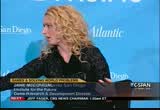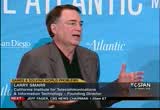tv Washington This Week CSPAN November 24, 2012 7:00pm-1:00am EST
7:00 pm
the last thing is, we should acknowledge and reward some of the original thinking that took place. i think the cable operators, in particular, comcast, time warner, stepped up for the first time as communication players and not just cable operators. comcast made their wi-fi access points available free. they made a whole bunch of announcements the to do not have to return a settop box after previously customers were fined after it was destroyed in a tornado. they are getting better about that. they should be commended for that. bryson should be acknowledged for having done the best job. we need to look at how and why they were successful and then
7:01 pm
all the stuff he did, you have to make that standard. we should spread the knowledge so that everybody else performs as well. >> going back to what you just said, and what you wrote on your blog, private industry taking over this infrastructure and having control of it. recently, the company's succeeded in not having to put it back up battery power on their cell towers. something you wrote about. if you would, a little bit more about this. >> we need to move away from the idea that this is not like the old system. therefore there can be no regulation, we are all dependent on this stuff now. no matter what kind of a private
7:02 pm
company you are, you still, if you are wal-mart you still have to put in a fire suppression system. it is not a violation you build it with private capital but we need to have basic public safety rules. these networks are providing critical services in an emergency. this is the time when you need to be connected. tenures ago, about five years ago, when those first reports came out, it was possible to say the networks are young, these guys are investing, and for the industry to say no regulation, even though standard, nothing enforceable, we are past that. there is a point at which were you have to say we are all about you are at -- doing a great job but to many people are dependent on you to let this be private sector decision making.
7:03 pm
we have to know how to plan and in an emergency, it is to everyone's benefit to have some of this in place. i know everybody focuses on cost. a friend of mine said everybody wants a cheap phones until an emergency and then they are like, where is my backup power? and he is right, it costs money. it is a decision we have to make about the trade-offs. we have multiple networks so that if comcast goes down, verizon can take up the slack, at&t did a roaming agreement, there is a lot of good stuff that goes on in the private sector. we have to acknowledge the role of the federal government and the state government in making sure that in the crisis ended the lead up to the crisis, we are ready and that in the crisis
7:04 pm
itself, everybody knows what to do. >> and the fcc said they're going to hold hearings. >> i i think the public notice asked all of the right questions. it is an opportunity to take a look at our world which has a bunch of different networks although we have to remember in a lot of rural areas, you have won the network. there are a lot of opportunities. there is a lot of good work going on but there is also a lot of liability and concern. they're a lot of people's lives dependent on this. this is not a luxury anymore. we are shifting all of our emergency response stuff over from television and radio. we are now including internet messages. if we are going to build our future on these powerful networks that are capable of
7:05 pm
doing so much more, we have to acknowledge the time has come to have some basic principles in place, some basic safeguards so that when the crisis hit, people know what to do when they are able to do it. >> harold feld, senior vice president of public knowledge. this is "the communicators" on c-span. the congressman recently wrote a letter to fred upton, the chairman of the commerce committee hoping to hold hearings on telecommunications. what is your goal with those hearings? >> my district, as most in new york, were disrupted by hurricane s&p. when we look at the disruption, it is clear telecommunications services were one of the key
7:06 pm
services that fail to perform. we want to have a hearing to find out what went wrong and what we can do to make sure in the future the same thing does not happen again. the fcc reported that the storm knocked out a quarter of the cell towers in areas across 10 states. people lost wireless television and internet services and it puts lives that risk and there was not correct preparation were we were caught by surprise. this is not something we want to happen again. the purpose of this hearing is not to point any fingers. it is simply to find out what happened and how congress can get involved in making sure to make sure this does not happen again. i am sure storms are becoming more and more commonplace,
7:07 pm
unfortunately. we do not want a repetition of what just happened. >> we have heard from the wireless industry that they were relatively pleased with how their networks operated and how the wireless services continued during the storm. >> i would like to hear from them. that is why a hearing would be important. again, this is not to point fingers. obviously the telecommunications industry was knee deep in this. they can -- in-line in us as to what went right. obviously all was not hunky dory. people lost power. is that something that could not be prevented? is this something if we changed might be prevented in the future? last summer a storm knocked out
7:08 pm
911. these things are becoming more commonplace. a hearing would allow us to investigate the reliability of the networks and identify and highlight the best practices and addressed potential vulnerabilities in our communications infrastructure. obviously i want to hear what the industry has to say. we can help in light in congress as to what we should be doing to prevent this from happening in the future. >> representative engel, have you heard back from chairman upton? >> we have not. it was sent to chairman upton and the chairman of the telecommunications subcommittee. this proposed hearing is not to be adversarial. it should be bipartisan and we want to find out what happened.
7:09 pm
i do not think there is anyone who would not want to do that. i would take it one step further. i would like to see a separate hearing to look at the utilities, the performance of the utility companies. we know there were problems. again, the point is not to fear point but to find out what we can do to make sure this does not happen again. >> would you be attending any of the field hearings? the fcc announced those. >> i would like to. i think it is important we get to the bottom of what happened. i realized it was a perfect storm, the storm of the century, which climate change and everything that is happening, we are getting more and more of these storms and is becoming common. i think anything we can do to get to the bottom of it, to find out what happened than to use
7:10 pm
that to make sure it does not happen again and that we can prevent these tragedies from happening. again, it is not just an inconvenience for people, it is dangerous. if someone does not have access to 911, if someone cannot contact anybody, this puts people in grave danger. we need to make sure this does not happen again. >> did you lose your cellphone service? >> i did not. i personally did not lose my power. but many people in my constituency did. there were many people who did not have cell phone service for over a week, it did not have cable and wireless for over a week and many people were in the dark without power for two weeks and more. it was a difficult time and we had to structure -- destruction.
7:11 pm
other places or more heavily impacted than mine. mine was impacted and many people suffered as a result. >> representative eliot engel joins us on "the communicators." thank you, sir. "road to the white house [captioning performed by national captioning institute] [captions copyright national cable satellite corp. 2012] >> in his weekly address, president obama talked about hurricane sandy. the republican responses by the newly elected chairwoman of the house republican conference. she also talked about thanksgiving and said republicans were ready to work with president obama to avoid the so-called fiscal cliff.
7:12 pm
obama talked about of the obama family, i want to wish everybody a very happy thanksgiving. for us, this is a day full of ta family, i want to wish everybody a very happy thanksgiving. for us, this is a day full of family and>> on behalf friends,d football. it is a date to fight the urge to take a nap, at least until after dinner. most of all, it is a time to give thanks for each other and for the bounty we enjoy in this country. that is important this year. we have just emerged from a campaign season that was passionate, noisy, and vital to our democracy. it also required us to make choices. sometimes that led us to focus on what sets us apart rather than ties us together. thanksgiving is a chance to put it all in perspective. to remember that, despite our differences, we are americans first and foremost. today we give thanks for
7:13 pm
blessings that are too rare in this world, the ability to spend time with the ones we love, to say what we want, worship as we please, note that there are men and women defending our freedom around the globe into book our children in the eye and tell them that you're in america, no dream is to be gift they are -- that here in america, no dream is to bake. -- too big. they see these jobs opportunities to give back. americans who believe we have a opportunity to look out for those who are less fortunate can move forward together. right now, as we prepare to gather around their dinner tables, there are families who do not have that luxury. many of them have lost everything to her game sandy. holmes, possessions, loved ones. it will be a long time before left it back to normal. in the middle of some much tragedy, there are also glimmers of hope. over the last few weeks we have
7:14 pm
seen fema personnel and first responders working around the clock. we have seen hospital workers distributing supplies. families offering extra bedrooms. the fire department advertising hot showers. buses full of volunteers coming from hundreds of miles away. neighbor sharing whatever they have, food, water, all electricity and saying again and again how lucky they are to have a roof over their head. it would be easy to do nothing, to worry about themselves and leave the rest to someone else. that is not to we are. that is not what we do. as americans, we are bold, generous, they carted people. when our brothers and sisters are in need, we get to work. not for thewe have seen hospitat because it is the right thing to do. because there but for the grace of god go i.. that is something to be grateful for comment today and every day.
7:15 pm
so to all of the americans doing your part to make our world a better place, it is my privilege to serve as your president. to all of our service members, it is my honor to be your commander in chief. from our family to yours, happy thanksgiving, every betty. >> hello, and happy thanksgiving. though the thanksgiving story began long before our founding, the holiday itself started in 1863 when president clinton gave thanks for the gracious gift of the most high god. first among them, being freedom. he invited americans to mark a day of thanksgiving so that these deaths could be solidly -- gifts could be solemnly acknowledge. to think that abraham lincoln
7:16 pm
could look ahead and see a future of peace and unity is an inspiring reminder of how truly blessed we are. this is certainly a time of testing for our country, a hard- fought campaign that has just come to a close. to many americans are out of work. our national debt exceeds the size of the economy and threatens to derail our children's future. as a mother, this is a constant worry. yet today we will honor the thanksgiving tradition with wishes of peace and grace. we will pray for those less fortunate. we will think of service members away from home and give thanks for them and their families. our hearts will go out to the families without power after hurricane sandy. we will look ahead to the
7:17 pm
holidays and a new year. that same spirit of optimism that brings us together today should inspire us all year round. that is why here, in washington, d.c., republicans have reached out to president obama in the hope of working together to help our economy grow and solve the debt that threatens our children's future. the clock is ticking. one month from now, unless congress and the president take action, the current tax rates will would expire and we will experience the largest tax increase in u.s. history. amid so much economic suffering, raising taxes would have a devastating impact on our economy. we cannot let this happen. republicans believe this is an opportunity to finally solve problems thatwill washington has ignored. whether it is the tax code or entitlement programs that are on a path to bankruptcy, no more
7:18 pm
short-term mandates or excuses. we can do this right. we can pass on our children and economy of growth and opportunity and government that empowers all businesses and stays out of their way. a country in which everyone has a shot at the american dream. republicans are ready and eager to get to work. we hope president obama is as well. america is a country whose people can do anything and whose leaders can envision a limitless future. today, as you join friends and family, be sure to celebrate as abraham lincoln did, with a hopeful heart. america still has so many gracious guesifts for which to e thankful. >> joined us tonight with a look
7:19 pm
at the evolution of facebook. he is an engineer who advises mark zuckerberg in talks about developments on the social media join friends and website. watch tonight at 8:00 p.m. eastern, here on c-span. >> this week, the president of the service employees international union talks about what unions are looking for in the debt and budget negotiations and the kinds of ads we might see. you can see it tomorrow at 10:00 a.m. and again at 6:00 p.m. eastern on c-span. >> paul rothstein is a law professor and an here is to talk to us about petitions to secede filed in every state, citizens have signed to secede from the united states, many of which
7:20 pm
side to the declaration of independence or the size of government. professor rothstein, welcome to the program. are you surprised by all of these petitions coming from across the country? is this a new phenomenon? guest: during my lifetime there have been several, near every time people get upset with an issue, there is a movement on the part of some people to get to their state to secede. host: what is it that is driving this movement this time around? guest: dissatisfaction with who won the election. it was relatively close, not that hair close, but a lot of people feel strongly about it. host: talk to us about what is actually in the constitution, or
7:21 pm
how a state would go about seceding from the united states. guest: there is nothing directly in the constitution about it. there are some things that the different sides of the debate site in their favor. perhaps the strongest thing in the constitution on or rebellion and would not be permitted. you have something that favors the right to secession and something that does not. what we're talking about is the right to secede unilaterally, not by agreement or permission of congress.
7:22 pm
that is probably a relatively easy. we are a nation founded on secession. we seceded from england. texas seceded from mexico. we support secessions all over the world, from the soviet union, for example, all the countries that broke off from the soviet union. as a practical matter, the civil war probably settle the matter that secession is the legal -- is illegal. you could not have a majority rule democracy. somebody wase dissatisfied, they took up their marbles and went home. >> this is not something taken
7:23 pm
seriously. guest: well -- host: it is a way of generating attention for their dissatisfaction. guest: i think so but it depends on who you talk to. there are some people who felt strongly about it. they say before the civil war, there is some support for that. several of the state is broke into their approval of the constitution, the ratification, we retain the right to secede. so there are people go for it -- who feel strongly that kind of precedent means secession is not a joke. host: there is a movement in all 50 states but the state that seems to get the most attention when it comes to talk of secession is texas. why is that? guest: may be because it has a
7:24 pm
history of secession. basis seat -- they seceded from mexico. texas has a tradition of it hasindependence, ruggednesso manliness. they are pretty big so maybe they could be a state of their own. host: even though the governor of texas has said he is not in favor of seceding from the state, there is a large amount of talk about this . earlier this month, we had ron paul talking about the secessionist issue. we would like to take a look at what he had to say earlier this month.
7:25 pm
>> i call for the principle of secession being recognized. the founders believed in and. there is no prohibition against it. they all understood they were coming together and if they are voluntarily coming together they can leave any time they want. they were protected with that belief, with the 10th amendment. but now, people have said, these people have to be put on a list they're saying they'd should be a right of secession. they want to put to them on a list that they are committing treason, thrown out of the country. what about the first amendment? the principle of secession is very important. not so much for the purpose of succeeding but saying to the government, if the mystery to us, that is what we might consider. host: paul rothstein, if you put
7:26 pm
your name on one of these lists, are you committing treason? guest: no, he is right, it is freedom of speech. he is in the tradition of patrick henry, the patriot who took a lead position in the revolutionary war against england. he wanted to preserve the right to secede and he objected in a famous speech to the beginning of the constitution which if yot your says we the people. he says they should say we the state. part of his reason is that the states retained the right that if things get bad, they can succeed. thomas jefferson wrote a letter to that effect that if things really get bad, there may be a right to secede. some of the founding fathers that were pushing for the ratification of the constitution said there is their
7:27 pm
right to leave if you want. it is just an experiment. they were motivated by trying to get the constitution signed if they felt this was not permanent. host: we're talking about petitions to secede filed in every state of the union with professor paul rothstein of georgetown university. if you want to get him off, the numbers are on the screen. a special line for people who have signed petitions for their state to secede from the united states. 582-3383 for those who signed petitions to secede from
7:28 pm
the union. our first call comes from north carolina. go ahead, larry. caller: yeah, i want to find out how the process works. does it go by the representation of the populace as far as your representation in congress to need some numbers to have a petition to be able to possibly secede? and we need a passport to go to another state that is next to us? guest: larry, there is no procedure. it is not in the law anywhere. we are writing on a clean state if it did go forward. it would need permission of congress and the other states to do it and a procedure would have
7:29 pm
to be set up. the reason there are petitions now is that the white house put into place a system whereby if a certain number of people have a question, the petition and the white house will answer it. these are not really petitions that will have the force of carrying us toward a secession. you're right that if there were a secession and texas became a separate nation, it would be as though you were going to mexico or canada and they would have the right to set up border control if they wanted to. i have the feeling that that happened, there would be agreements with texas and the united states whereby it we pretty much like the status quo or going into canada. it would be in name a separate country but there would be
7:30 pm
cooperation. there is always the possibility of a constitutional amendment which would provide a procedure for secession. it takes a lot of votes to pass a constitutional amendment. as it exists, there is very little in the constitution that bears on this although both sides try to point to language that seems to favor their side and there are some things in the constitution that favored both. host: our next call comes from juanita. go ahead. caller: this is an interesting program. thank you for c-span. south carolina is the leader in secession movement historically. they are at the forefront again of this movement. the south carolina people are
7:31 pm
wonderful people. but our political system, we still have a good old boys system which is very backward. i think south carolina has nothing to gain by seceding. we have one of the worst educational systems in the country. we lead in incidents of domestic violence. the pay scale is far behind those of other states. host: do know anybody that have signed this petition? caller: i am sure some neighbors probably have. i do not have a lot of family here so i cannot speak for them. i did not sign it. i think south carolina would be better served if they learned from some of our better managed, better educated, better run states. guest: juanita, you put your
7:32 pm
finger on it. this is not so much a legal matter but a matter of practicality, politics, maybe of push and shove. overall it is a matter of would be to the advantage of any state to secede? that usually comes down to economics. i do not think there is an a vantage in terms of -- you could assuage certain feelings about social feelings on social issues. but certainly, economically, it would not be a good idea. host: linda from dayton, ohio. caller: i am an african-american democrat. i find this ironic that a
7:33 pm
husband of 50 years, we had this conflict within our country. and today, i hear about this succession. i am wondering if it is racially motivated. guest: it does not seem to be proceeding on that basis but it is true that it is the republican romneyites signing these petitions. i do not think they are racist. but if it is true there are fewer minorities voting for that party than the democrat party, so to that extent, what you say may have some indirect basis. host: kenny from kansas. caller: i believe this is a
7:34 pm
frustration from washington is from frustrated americans who are tired of washington. term limits should be in place in washington and also to be elected, officials should have to be able to balance their personal debt and not use credit cards to pay their bills. and get the youth of america involved. it is your country to run into the future. guest: i think there is a lot of feeling that it is washington that should secede. we should cut them adrift and not cut taxes off. i think there is a combination of frustration behind this. but we do have majority rule.
7:35 pm
you cannot have a situation where people who lost, they say, i am taking my marbles and i am going home. it is poor sportsmanship. it makes it difficult to run a country where the majority rules. >> we are talking with professor paul rothstein. petitions to secede filed in every state of the union. our next call comes from travis. caller: good morning. i just wanted to make a comment. i find it intriguing that these states, especially texas, this is a very small majority of people. people should understand, it is not 70% of the country or anything like that. the thing of it is, if texas
7:36 pm
succeeds -- secedes and the hurricane hits was going to help them? i think there's a lot of anxiety and tension has built up over time, especially in that part of the country. people feel change coming. i am a black democrat. you notice it is always the party out of power that is the one that is most wired up about this. i think a lot of people are taking it out of control. guest: there is a point to that. be careful that you might get what you want. that might be bad for you.
7:37 pm
the hurricane example. if it did happen, there would have to be, and there would be agreements between the new country and the united states to provide for economic assistance in situations like that. it would be in their interest to keep the country, to keep it friendly to prevent foreign invasions through that country. they have that trouble in england with ireland. host: many cite the declaration of independence in their reasoning for declaring what they want to secede from. how does that work? guest: that is the secession, the declaration of independence. abraham lincoln had the reverse
7:38 pm
of the declaration of independence. he said it showed there was a union of states, a strong union that they all got together to sign the declaration of independence informed the united states and the articles of confederation and then the constitution. so you can read that in different ways. host: back to the phones. our next call comes from ray in texas. caller: i would like the professor to comment on the comment i want to make in terms of, it is strange to me that when republicans are in control, you hear a lot about being patriotic and its importance but then when democrats get in control, and it is a matter of
7:39 pm
individual rights, states' rights, the very same kind of talk that happened to cause the civil war. it seems to me there is a double standard when it comes to being a patriotic american. guest: there is some tension between proclaiming patriotism for america as a country and then saying, we want to secede. the pledge allegiance says one nation under god, indivisible, so that the country is indivisible. that is the hope for the country, as a unit. >> we want to remind our viewers we have a special line for people who have signed a petition to secede from the united states.
7:40 pm
our next call comes from michael and florida. he welcome to the program. are you there? >> i agree with paul. i think we should cut washington and send them adrift. >> what made you want to sign the petition? do really think that could happen? >> i think it can and i think it would be a good thing. we would not be tied up in all of the bureaucratic nonsense. >> would you see florida as becoming its own country? or maybe grouping with other states? >> the latter. host: we had a war over that. caller: we won. host: which way would that be?
7:41 pm
mike, you still there? we had a war over that and did not turn out too well for the guys trying to secede. be ok thishink it'll time. professor? guest: it is interesting that the states got to get there, and the mind -- may not be contiguous. it might be florida and texas would form the new union. that would be some problem. you have to lobby to get them. i think that your new country would eventually become -- you would get frustrated with the government of your new country. i think what is happening in washington seems to be a proclivity of human beings when they get into power and when you try to unite, you lose.
7:42 pm
host: lois is on our line for republicans. caller: the world is listening to everything that is said. we need to look back at united we stand, divided we fall. host: what kind of message does this send when people talk about secession? caller: it isn't tearing the country apart. you cannot stand on your own. guest: sour grapes, being a sore loser, and ended is true that -- anit is true that in unity there is strength. we do better as a bigger unit, i
7:43 pm
think. host: todd in maryland. he is one of the petitioners. loser, and ended is trueyou're d to secede? caller: i did sign one. host: what you want maryland to secede? caller: i do not want to be on the books for states that are going into bankruptcy and petitioning the federal government to bail them out. i do not know that is such a good idea. host: you expect one day maryland might be its own country? caller: well, it may not be so much that, it might be that we are putting our foot down and saying we do not want to pay for other people's mr. wang's -- misdoings. host: natalie says the best way
7:44 pm
to secede is for a sympathetic governments and individuals to stop complying with directives from d.c. dictators. would you go along with that? hello? professor rothstein, your reaction. guest: and natalie, natalie's talking about a notification which is closely allied to secession. he refused to follow the federal law but used a part of the union. the constitution forbids that. there is a supremacy clause that says a federal law has to be followed, it is supreme. that would be punishable.
7:45 pm
i do not think it is possible to stay in the union and have nullification. abraham lincoln argued from the supremacy clause that there can be no secession because federal law is supreme. there are some flaws with that argument. i saw the new abraham lincoln movie. it is absolutely terrific. but it does show you that he bent the law very much in order to get, accomplish the vision he had. every once in awhile and history somebody comes along with that kind of vision. and it does show that some of these things are not subtle -- settleable by law. host: other than the fact that secession did not work for those
7:46 pm
states that wanted to do that in the 1860's, what other lessons can be taken from abraham lincoln? not necessarily the movie. but lincoln argued from the supremacy clause that there can be no secession because federal law is supreme. there are some flaws with that argument. i saw the new abraham lincoln movie. it is absolutely terrific. but it does show you that he bent the law very much what lesn from that year and placed in what you see happening today? guest: the movie, by the way, it is based on a book about abraham lincoln. i think that president obama must have steadied abraham lincoln closely. i see some parallels between them. he very much believe, single- minded lee that the poor shall have health care. abraham lincoln believed this
7:47 pm
shall be a union, and shall not be slavery. every once in awhile summit comes along and do not know if they are right or wrong until many years later. we will not know if president obama is right or wrong. host: we're talking with paul rothstein of georgetown university. our topic, petitions to secede filed in every state of the union. one of those is texas. caller: good morning, everybody. rules and regulations is killing this country. they all issue forth from the corporation known as washington, d.c. nobody wants to secede from the united states. they want to secede from washington and wall street. they have run up these bills. we have not. host: did you sign the petition? caller: i did not. do i want to ask obama, daddy,
7:48 pm
can meet secede? guest: i think that is what we are seeing. the secession movement is not a secession movement as pushing washington about. that can be done in the ballot box. a lot of people are dissatisfied. try again. host: ken calling from florida. he signed the petition. caller: i believe in secession. i think the best thing you could do is repeal the 17th amendment and give the rights back to the states, where it belongs. host: can you turn down your television?
7:49 pm
do you honestly believe that florida will one day secede from the union? caller: i tell you, i am originally from new york. in 2008 i witnessed the acorn people go around the cemetery and take names off tombstones. we have pictures of them getting in and out of their car. then i understand they did not go away, they came back and they started airing of voter machines. taken to the ballot box, that is a great in theory but to was to believe the ballot box after this last election? guest: well, there is always going to be imperfections in human endeavors and i think the answer is to work to try to eliminate the imperfections and
7:50 pm
make it more perfect, to make it better. the preamble to the constitution says in order to form a more perfect union, as compared with the loose articles of confederation. that is a testament to the human striving to make things more perfect. it is also an argument that there cannot be secession, it is not illegal because the constitution says in order to form a more perfect union. on the other side, the articles of confederation actually talked about a perpetual union. and the constitution does not say perpetual union which suggests it is not a permanent union, it was not meant to be perpetual. my point is it shows a striving
7:51 pm
and we should try to perfect what we have and not render it asunder. in my personal view. but others feel strongly. host: professor rothstein is that georgetown and focuses on the judicial process from the supreme court as well as other issues, he is the author of " evidence." and "federal rules of evidence" and has written over 100 articles. caller: thank you to c-span. i have a couple of questions. do you think that if the secession movement, have they gained a lot of momentum, could
7:52 pm
pressure the pope -- politicians to be more accountable? the you think -- do you think the movement would broaden their -- involve more people in change the talent? it seems like some of the people who are calling, it is kind of like anti-obama. i am thinking that is bad, if they want to get more people involved. if they want to give blacks or hispanics involved. maybe they need to change it from looking like something racial and more like we do not like what washington is doing to our country and people. guest: i think that it can make politicians sit up and take
7:53 pm
notice when there are a number of people who are so distressed they're willing to give up their citizenship in the united states, which is a big move and means they feel deeply about it. a smart politician will sit up and take notice. i do not think it will ever get congress or the rest of the states to agree to a secession because that is not in the interests of them to do so. something that was said is important in the legal aspect of this debate. there was a case after the civil war and the supreme court, white vs. texas, where the court said texas was always a state, even when they pretended, or
7:54 pm
tried to secede during the civil war and that suggests secession is not a legal move and this is an indissoluble union. the supreme court to did say if it were by agreement with congress or the states, or through war, then secession might be possible. host: suzy writes -- we may not be able to stand alone but we sure as hell need to stand against the government. our next call comes from of louisiana. he has signed a petition. caller: yeah, it is more just like a protest, how else -- someone complained about and uneducated electorate to view
7:55 pm
them as a popularity contest. host: are you serious about louisiana seceding? caller: i think it is more of a complaint. we have an electorate out there who does not take the election seriously so we have to live with the consequences of these other people. host: besides signing the petition, have you gotten involved in any word -- any other actions to further this movement? caller: no, i think it is doomed to fail for the reasons you have been speaking about. i think it is just to voice a complaint. where else are you going to go right now? as mr. obama said, an ordinary citizen, where are you going to go? host: what about back to the ballot box? caller: we tried that already. there is an uneducated and
7:56 pm
electorate to use these things as popularity contests. guest: window makes clear it this is about the dissatisfaction with things that going on. deciding whether you want to be a secessionist, you have to decide whether you get more benefit and enjoyment out of being in the united states, with all of the things you do not like about it, or whether you would do better outside of the united states. i think it is a balancing act people have to do individually. you have to realize, you are always going to lose some elections and not get your way. one of the philosophies of secession is that it should be reserved for a situation where there is deep, deep
7:57 pm
dissatisfaction and not just that you lost the current election or there are some things you do not like going on in the government. there the proper thing to beat -- would be to work for change. you agreed to a majority rule. you will limit -- win some and you will lose some. to me, it is not that bad. host: ridgewood, new york. caller: i'm calling in with a couple of points, race and conservatism regarding the south but a lot of these secessionists are learning from the movement in vermont, which is more of a liberal movement and they have more of the infrastructure. while i do not agree with secession, i do not think it is prudent, i think nullification is a better way to go.
7:58 pm
i would disagree with a professor in the sense that the federal government is only supreme in what they have been given. my state could not go to the metric system because that is a power given to the federal government. guest: i think that is right, there are some things the federal government does not have power over. it has powers enumerated in the constitution. it seems to be a rather broad power, even the conservative supreme court felt the health care act was within the federal government's power. if it is outside its power, then it is not to nullification. it is perfectly legal for the york not to follow it. if you can get the courts to sustain that, that is fine.
7:59 pm
it is the way to go. you pursue that and your state pursues that and you can take it to the supreme court. but if you agree to live in the united states, you have to be bound by what the supreme court says until you can elect a new president. host: we have been talking to paul rothstein of georgetown university. petitions to secede filed in every state of the union. thank you for being on "washington journal." >> tomorrow, we will talk about steps the government can take to combat cyber security threats. we are joined by the former navy seal and member of the council on foreign relations. that is followed by a look at labor unions and their priorities in averting the so- called fiscal cliff. our guest is the president of the american federation of teachers. and then we'll discuss the drone
8:00 pm
strategy with the departure of the david petraeus. our guest is -- 7:00 a.m. eastern on c-span. >> next, the vice president of facebook talks >> after that the chairman of cbs news on the future of the network. now a conversation with chris cox, facebook's vice president of product. he talks about the evolution of facebook at a conference at the university of california san diego. this is about 50 minutes. >> thanks, everyone for coming. i do think this is actually a
8:01 pm
bit of a treat. i have been covering facebook for years and years, and you rarely see chris cox out here doing his visionary thing that you are about to get. your title as the vp of product, which is a suspiciously vague title -- what do you actually do on a day-to-day basis? >> over the last three years, i have built out the product management and the design teams. each group of people that is building a new feature or product has a bunch of engineers, a product manager, and some designers. i have been responsible for building out the product management and design and functions at facebook. >> for people who might not think of product the way you do, what is a product on facebook? >> the like button is a product. newsfeed is a product. your timeline is a product that facebook delivers. it is a little bit of an interesting twist on a product because a product in a lot of consumer technology companies would be like a single-player game.
8:02 pm
you are interacting with a service, the service does stuff in response to you, interacting with you, and facebook is a little more of a medium. the product is more like building a container that moves around ideas and concepts and content in a way that is predictable and is easy to understand. >> you have been had facebook since 2005, right? >> yes. >> it has been seven years. you have done a bunch of different things. one of the most interesting is you came on as an engineer, but you moved over to human- resources at a certain point, right? >> yes. >> what were you really looking for out of facebook's employees? you have thousands and thousands of resumes passing in front of you. what was the thing that you were looking for that made them a facebook employee?
8:03 pm
>> we were looking for imaginative people. we were looking for scrappy people. a lot of the folks we were interviewing at the time were coming out of stanford university because that is where we were perched, right on university avenue, two blocks down from stanford. we were interviewing a lot of engineers and the folks coming out from stanford. there were some types of people that were super sort of academic and super sort of slow and meditated in how they approach their daily work. i was coming from academia as well. i was one of those people and there was another type of person who was the experimental and fast-paced and were builders at heart. they got their joy out of building. and watching people you something and learning how they could be better builders and people could interact in a modern way. we were looking for that sort of packard-builder tight. >> what was the most unusual hiring story? someone had facebook and you hire them. >> that happened.
8:04 pm
two stories. one was hiring the college professor that taught me how to code. i walked into an interview and i did not know who i was going to interview and i walked into the room and there was this professor, jerry king, who taught a few classes on introductory computer science. i was used to asking computer science questions a lot. out of that class that he had taught me. what joy ask him? >> what did you ask him? >> i asked him a problem -- a graph traversal problem. hydrograph one of the board and we started talking a lot of which are applicable in social networking. >> why did you want to work for facebook? >> i asked him that as well. we had some people who were young hackers.
8:05 pm
there was this kid who created a hack so when you look at their profile your profile would turn into a myspace account. facebook was a blue and white, english only, college kids only. myspace was what everybody thought of. >> one of my good friends, i remember going to stay with him and he said we don't know how we're going to catch myspace. seven years later. in an alternate in a verse where mark zuckerberg goes back to school or does not get funding, he gets in a bicycle accident and does not decide, he can i continue.
8:06 pm
how different you think the internet would be if facebook had never existed? >> i have never got that question. i imagine it would be pretty similar. maybe a prolonged time frame. i tend to think and a lot of us tend to think that a lot of these technologies are going to get billed at some point. it's a question of when and by whom and the qualities it has and what is the story behind it? and believe something like facebook would exist. i do not know if it would be as big right now i and 2012. >> 1 billion users. >> facebook got up to 1 billion active users which we do not know how to think about, frankly.
8:07 pm
i think mark had an incredibly clear vision that develop quickly and he got this massive opportunity dropped in his lap. i think he rallied a bunch of people wrote that the -- around that. you have to think that something like this would have come about maybe more slowly. >> i wonder how you think about -- sharing thing preceded facebook. the amount of emails or instant messaging is still huge and it dwarfs all traffic. facebook, the way you share and making it index of all, searchable -- indexable, searchable. how you structure it? >> we talk about facebook being a medium and the idea is a good medium does not interfere with the message.
8:08 pm
it provides a container that is transparent, easy-to-use, reliable, fast and honors the message of the center -- sender. >> is it possible to have a medium that does not alter the message? >> marshall mcluhan said there is no such thing as a message without a medium. they have th e proper -- the property of being easy to use. it is on a giant flat screen monitor in palo alto. it is on all kinds of devices and the medium needs to be something networks. we look at things that are simple to use as speech. like commenting or liking are sharing. we do not create new words or a new name for product that is just about commenting or messaging. the message product is called messages. our news feed product is called
8:09 pm
news feed and our photos product is called photos. it may sound silly but you get into these discussions and there is an inherent bias for a lot of builders to create something that has its own brand. that is what most consumer products do. facebook has started from the idea that it should be sort of like a glass. it is clear and as much as possible, really is the intention of the sender.
8:10 pm
>> want to talk about the diversity of users that facebook has now. is anyone in this room, did they get a smart phone before getting a computer? you like everyone here, we have computers and some way of manipulating this cursor on the screen but the last few hundred million users and presume bullet -- presumably will be people who got a phone before the got a computer. these mobile first users, water the different and what have you learned from them by watching how they interact with facebook at each other vs. people like us. >> the average new facebook user
8:11 pm
is india, indonesia, or brazil. there are using a mobile phone to access facebook because they have not had access to the broadband laptop or pc. there isn't a infrastructure like there is in the u.s. people here will say it is good to hear updates from france. in the middle east, facebook provide updates to news and people who have any access to affirmation of and you get a story about what facebook means to them. i -- that is awesome. >> do you notice things that they behave differently like a system?
8:12 pm
they sure more pictures, less links, or ever want interests the same why? >> one interesting thing is cameras. which is something interesting thing. four billion may have access to a touch screen, a gps, a touch screen that was more powerful than what sentence to space, hopefully for a cheap price. we look at that and we say, all these people are going to have video cameras and cameras in their pockets and they will be able to have a lands and to the world that they can share with us. we look at found as being not just consumption devices but also publishing tools and that is an exciting way to think about the adoption of mobile phones.
8:13 pm
>> do you think these people are born to be like billions in the world, will they be mobile first or only? a lot of the reason people are using phones first is that they are relatively inexpensive. will the transition over? i think they are but i feel like i am in the minority. >> a lot of people will be mobile. just because of the geography and the data available where there. pc's are not going to go away. they're still -- you'll have a moment that your breakfast table or your couch order desk at work where you're going to be sitting down and computing and you want a big screen. there's no way around that. >> for me it is the keyboard. we talk about this group of people, 1 billion people. should facebook have some elected body that governs the site?
8:14 pm
>> we do take a lot of feedback and we have a vote that goes into effect everytime release a new terms of service. we did go out of our way early on to end of the user base and give feedback on and approving the release of new terms of service. we decided not to have votes on new features, and we did talk about it. if we look at that features, it would be allowed to see who looked at my peripheral, i want music playing, and want to decorate my wallpaper. we looked at those and said those are reasonable but if you look at the way people are behaving, you saw much more interesting ask, i want tos ee what's -- to see what is going
8:15 pm
on with the people around me. i click in to see if anything has changed. we use a behavioral analysis when trying to determine what product will be successful rather than a vote. >> what about the elected representatives? this is like the world's largest agglomeration. some have elected bodies of people. something the gives the user is a vote. >> it is an interesting idea. >> that means no. [laughter]
8:16 pm
if you go back now and look at what mark zuckerberg was saying, he was open with the idea that the wanted everyone in the world to be an facebook. what is the thing that now you are completely open about the ambition but it happens in three years or two years or five years, we're going to be like, what got word that -- where did that come from? >> mark talks about categories transformer to be influenced by social media. you are seeing that with news and more with -- the way that people this cover and -- news coming from social media. >> how many people here get their news from social media? i do.
8:17 pm
you kind of get your news from social media. >> if you think about what is happening in categories, there is commerce and travel and shopping. these are right now one player games. if you think about your going and deciding where you're going to stay on your trip to bangkok, you are interacting with a collection of documents written by relatively anonymous people. the same is true in deciding where to eat, finding a pair of jeans, and a lot of decisions you make when you're online. we'll see the way the world is going, we will make more of those decisions with a computer in front of us. which hotel to stay at, where to eat. maybe one day who to vote for on proposition 21.
8:18 pm
we look at that as an opportunity to turn it into a multiplayer experience and not just facebook but the ecosystem of social media and developers. you can imagine that the travel experience of designing a trip to bangkok is one that is influenced by where your friend has stayed, i bet you will have dos and don'ts, a great place and a beach you thought was beautiful and the temple you would have avoided because the line was long and a piece of it like she might have for a traveler. all that stuff israel. if you had a phone with you, you could press a button and legal little trail there. when you showed up you could see that this is what people had
8:19 pm
done. that starts to be a compelling way of thinking how computers cancer to be more of a conduit of the lenses of your friends in the people you trust and anybody in the world rather than an internet connection with a screen on top of it. >> won the presuppositions of that is that you need a persistent identity that is attached to every person in your life. that has a memory. this thing has to be searchable and be in place over all the times in troops and things. the uc that as a novel view of identity or are you replicating something that is occurring in the real world? >> so phones are something you have with you all the time.
8:20 pm
you only have one phone and you do not share with people. your the one person who uses your phone unless you are sharing some 1's photograph. it contains all your information. the applications you use. facebook, we think about it as an opportunity to connect. if you're having a fallen and a tabloid -- tablets and you have hundreds of applications and it will have lots of content behind them.
8:21 pm
facebook has become this that led to transport that this is my friend or let this person's music or this is -- is set of transporting this, to provide a continuous experience on your behalf. with that caveat that if you want to log out you always can. >> one of the concerns i hear from people is their kids are doing things now there are going to be attached to them over the long haul. in the past you are 19, maybe there is a couple of polaroid's plan around. you are able to move on from that period of your life. could you build forgetting and to freeze production? -- into facebook? >> you could change something that each person was in control of the representation people put on their profile. one of the unique thing was privacy controls. that was only possible if you had a system that knew who people where. you can amend the way you portrait yourself. what facebook has provided as a set of tools that people -- let people ramiya. -- remediate.
8:22 pm
on the small side, someone posts a picture of you and you want them to put it down. facebook is designed to like a billion person conflict resolution machine. diminishes the current work they do but it also has of these other features in terms of getting people back to the person they're having a dispute with. give them some numbers because the scale of it is like ridiculous. there are 7 billion photos of bloated every week. we are dumping massive amounts of published content. the internet in the 1990's, were trying to imagine it, it was like these web pages and it would -- a new web page would get treated and a few hundred or thousand would get at it but it has been exploded.
8:23 pm
8:24 pm
it is these tiny bits of, 10 -- content. a lot of people would write us a letter. dear facebook, i don't like this photo because i look kind of chubby. >> it was a pretty bad picture. >> the tool, you can report a photo. it wasn't supporting this case. it wasn't this is illegal or misleading, it was this is embarrassing. a group at the university of berkeley studies the language of compassion and comes up with the best tools to help people mediate a problem and directs the message to the person that
8:25 pm
posted the photo. what started happening is this really cool thing which is people started resolving their problems together. the publisher gets the feedback. it would be one thing -- you should think more about this. we were able to build a set of tools so people can result of -- reside quickly. >> you're getting hundreds of movements like this. >> i do not know the number. >> this is smart to have tools. people often times when they are suicidal, making me feel down
8:26 pm
and suicidal. let's say you feed that. how did you do with that as a friend of someone who is saying these things. we developed a process. it will be thousands of people will get help. because of the scale of the thing. facebook is like an american company. do you feel like there's some set of values that are embedded? the mission of the company is a more open world. which sounds american free speechy.
8:27 pm
>> top the -- to the extent that this could be argued, you can put a message in a container and send it to whoever you want and that is something you should have the ability to do, unfettered. that is something that communication technology has made faster, easier, and cheaper since the beginning of time.
8:28 pm
one way of looking at facebook is one more step in the process of making communication from what is in your head to what is in line. periphery in high resolution. quickly. that is what facebook is doing. we view ourselves of the highest level. the users and the product is international. we bought tools so facebook is available in different language countries. and in most island languages that are available to the internet.
8:29 pm
how to use the word like. the process of tranalsting. this is a tool that has gone above and beyond the united states and that is something we should be 6 bided -- supporters of an excited about. >> twitter works like everything goes out there and it is a -- everything that people post, it is there.
8:30 pm
8:31 pm
and people are connecting to more than just their friends, they're suggesting -- they're committing to these individuals. each person has all these channels that are publishing stuff of everyday and i have a fixed format. maybe they are on an iphone or dan android pc. you want to give each person the best possible handful of pieces of content for them at that time. that is a growing problem. it is during free quickly and we believe it is important to solve. there is a bunch of machine learning, a bunch of infrastructure to assemble for each person. one thing i think about this is your publishing for each of $1 billion ever met. in needs to stab today. there is a model that tries to project is most likely to get air active with optimizing -- news feed optimizes what they would like to interact with. what will create a consumer of between the publisher and consumer? that is the high level.
8:32 pm
>> you think about how that system works for. lettis positive feedback. you'll get more of that thing. how do you tweak the algorithms so people ill don't show up -- it is a personalized newspaper. how do you now the difference between how they interact. people want to have both interactive, one more often but they want to see the other one and check it out occasionally. >> the main thing we rely on there is people. one of your friends posts the article. and some of your -- there are people who are posting articles about a particular thing, they're people who are noisy and do not speak very often. there are people who are domain experts in. to hear things and sure a lot of music. there are people who only share photos of their children. for their cat. one of the things we do is preserve a balance so you're not just seeing one person or thing. that goes along with what people tend to enjoy and address with. there is a little bit of diversity and a little bit of a coin flip.
8:33 pm
>> how would you like to sit at the controls knowing that you will find out? is an incredible supervision. it is something that is exciting to do. it was the first hard i spent. nobody liked it. imagine spending 10 months in a secret starter. your working on something. your friends ask you, what are you looking at. there were people i hadn't heard from. what did you do to my home page? we waited for the positive emails to come in and i think i got one from my mom. we tried to understand what was going on and we talked to neverland. you ask korff feels. if you walk outside the door. it is not just this big number out there. is knowing that everybody in life is on your side. to give some doubt it -- and dollar value, and it most people would have said this is -- this failed. we believe that the conduit could be built. it was easy as putting -- pulling a fall in output of your pocket. we -- when we watched people use it, what the hot -- people were using it a lot. and it will wait for two or three weeks and the e-mail is gone and we will we killing mailing headlines like ms. feehan, were graced finger while -- this is the greatest thing. you go back and look at the first radio and everyone said this will invade our privacy. they will call and i am not home and it will break into my house.
8:34 pm
8:35 pm
8:36 pm
8:37 pm
>> let's open it up to questions. we have 40 minutes. there is a microphone coming to. right there. if you'd like to give your name that would be wonderful. >> my question pertains to the impact of facebook on democracy. i am concerned vis-a-vis the fact that rogue government is able to shut down internet sources. are there people who help keep facebook at running?
8:38 pm
i am figuring out how it can be effective in countries that are closed with their communication. >> we do not have spies that i know of. i am not a spy. >> if you were, you could not tell us. >> we spend a lot of time and energy making sure facebook is available. we spend a ton of time on infrastructure and hiring people to make sure that you can get to that news feed. when it comes to governments that shut the internet off, that -- there is not a lot we can do. it is interesting that young people -- i had a friend who
8:39 pm
spent time in iran wanting young people use technology. one of the things he observed is the way he put it is the average 18-year-old knows every last detail of how bluetooth works on their phone, all the internet and facebook, the ins and outs of twitter, how to change your -- and the setting so someone can message you. every last detail their understood. when he asked them to are you afraid of the government finding it, they would say they do not understand how this stuff works. it was a message that -- in places where people do need an outlet or way of communicating that is not necessarily available in the public domain. it is a completely different animal. >> we have written about this issue on the security side. one of the worst things that happened, people log in and the government puts middleware in and that allows them to capture
8:40 pm
their password. if you do that that is the issue are wrecking their servers so they have a lot of resources behind stopping that from happening. you know how often times they used to be like http:// and now it is https:// and that has to do with increasing security and helping you out. another thing with hackers. the biggest breaches tend to be, there is a pizza place that stored everyone's credit card sitting on a box. whoever ordered a pizza, a bunch of hackers got into it and it
8:41 pm
was 50,000 credit cards go down and that has happened many times multiplied by these legacy systems. and has been bad in terms of crucial data. >> i was curious around this concept if you had a discussion around the muslim video that came out, did you have conversation if that happened in a facebook context and if you think about this super country aspect that you are providing and what the effects are going to be and what the short-term things are compared to salman rushdie now and what is happening?
8:42 pm
>> i think of that video as a product of the internet. >> that video -- we do not know the whole story of what was going on. the fact that i do not think it was a spontaneous thing. you had that video get translated and move within the social circles in the world. i do not blame the internet for it. you could have that like a regular news station and it would have had more effect. >> i was wondering if you could say more about monetizing facebook. you said it was free but a billion people, that represents a lot of disposable income. could you say more about where that is going?
8:43 pm
>> the primary wave facebook is monetizing is advertising. we want to provide free service. 1 billion people represents a lot of costs to keep everything up and running. advertising is the natural business model for content distribution company. it is the model for every medium. an advertiser can pay to promote wherever it is, whenever the message is they want to sen. the very highest level that facebook can be is a better solution for advertising. it will be easier for the ad to care brought to reach you then medium to do not know who you are. >> they're interesting takes on people -- how people will monetize. we know how to make content people want to share with each other which would go to lots of people so they started to create the ads for their spread ability.
8:44 pm
>> i'm curious about the thought process that goes into coming up with the next evolution of facebook. what were the gestations to come up with that is feeding and how many brains -- >> you're right. i think like that. and then you gave birth and no one like the baby. after a while people get used to their kids enjoy in them. moving on from that process, what goes into making the next evolution?
8:45 pm
how many brains go into it? and then when you think far advanced, do you take on an outsider's considerations? i am thinking of a generation of kids whose parents think they waste more time on facebook. is there any way of thinking about integrating facebook into educational systems? encouraging kids to facebook in a creative way. making a microcosm, something that may have a more positive predictive outcome from an educational standpoint. >> would love that. the schools are the hard part of their. >> what kind of communication do you have? where would you go with that?
8:46 pm
>> we have watched the nascent parked called communities that -- product called communities. it makes sure that only students at that university can use that group. it is a mega group that allows cornell to add the classes and courses. a lot of what was useful finding a class. that was really hard in two dozen 3 to find someone in your anthropology class that lives near you that you could study with and that bit of value multiplied by a billion, it turns out so much of the learning process is people learn less. we do things that are broadly useful like that and can be launched and have a girder of utility, only cornell students can use this and you can create some groups in cornell for your team and classes or whatever. we will keep looking into doing that.
8:47 pm
>> the other answer is also that they have an ecosystem of companies that are building on top of facebook and it seems education is one that looks more likely to be felt by an outside company that takes that infrastructure and does something interesting with it. last question in the back. >> with respect to instagram, how does that compare with the vision that pinterest has for itself? >> we saw instagram as being a compliment for facebook. you could take your front door and put a filter on it and put it in your friend's news feed. the utility was so tied up in the utility of what facebook was doing with that it was a natural fit.
8:48 pm
we went to school with those guys and we knew them well, they loved facebook. we liked each other and we have a similar view from what happened and there were growing like crazy. just a remarkably engaging product trade uc their numbers, they're the same. pinterest is used building -- with the tools that facebook offers. you can put this on your time line. if you are hsu collector you can have these grades of shoes you have collected over time. we see them as an awesome partner going into the future. there is going to be a bunch of things like that in the best we can do is provide a world where you get to do exactly what you want and facebook is to the extent to want to share it or spread it to people or collect it on your time line, you can do that there. >> can you tell us one thing about mark zuckerberg we do not now?
8:49 pm
we already heard he wears the same clothes every day. >> mark and i's dogs played together. we have this q date -- this cute dog named snoop. and a poolie. >> who's dog is the top dog? >> mark is an avid dog owner and dog lover. >> thanks. [captioning performed by national captioning institute] [captions copyright national cable satellite corp. 2012] >> at the same conference, there
8:50 pm
was a discussion on the health issue as well as gaming. this is about 50 minutes. >> we will switch into a really future-oriented talk. she is a phenomenon. i could not be happier to get a chance to talk with her in front of you and everybody else in webland. talk about how this gaming notion developed. >> i started working with the institute for the future. it is a nonprofit group in the
8:51 pm
united states. a lot of what we do is look at the technologies and figure out how they will change how we live in the future. i had done live ph.d. at berkeley looking at gamers and how the games there were playing was changing what it wanted to do in real life. all the communities who would play their games and get all these great skills and look for a juicy problem in the real world that would let them use their skills. and there were none. what i started to do was look for ways you could create experiences that let people use their skills to solve problems.
8:52 pm
games are helping scientists have to cure cancer and they're working on climate change, everything you can imagine. >> i do not think people appreciate how the giants this world is. when chris was saying 1 billion photos were applauded every week, that is amazing. tell us about how big this global gaming phenomenon has grown to. >> there are more than 1 billion worldwide his spend an hour a day playing a game on a network device consoles, computer, mobile home -- mobile phone. >> how many are in this room?
8:53 pm
>> all those angry birds hours count. >> three. >> this is not the most representative. >> tell us about this world that we are not experienced with? >> we know one in four gamers is 50 or odler. -- older. it is 13 hours a week for boys and eight hours for girls. this has been a big shift over the last decade. we still have a gender divide. now it is 94% of gross are giving regularly, getting the same proficiency with technology, the same social skills, collaboration skills so it is good news we see gross gaming. >> i can remember 25 years ago
8:54 pm
that my two boys who are now 30, we needed to get them engaged with games because it was born to be important for their future and bring development. if you sit in class and you're lucky if that teacher calls on you to answer once a day, whereas if you are in -- making a decision once a second, 3600 times an hour. that is what drives neural development in your brain. my guess is that these kids have physically different wired brains than the older of us. >> that is one thing i got into is a neuroscience of gaming. a couple of interesting points that we know about games from what researchers are putting on at figuring out.
8:55 pm
gamers spend 80% of the game feeling -- failing. educational research -- the sweet spot for learning difficult material is to be able to fill 50% of the time because it exposes the gaps between what you know and what you do not know. to realize that we have this world of gaming where gamers are allowed to fail and have to fill most of the time does not allow them to progress toward higher levels of proficiency and ability. we also know that the average young person is right to spend 10,000 hours playing these games by 21. if you look at middle school and high school attendance, that is 10,084 hours in the classroom with perfect attendance.
8:56 pm
there are spending as much time playing games as they are in the classroom. learning to be a good gamer. >> it is interesting that failing early and often is what you want people to do when your prototyping so those are really great skills. i am sure people are thinking that is a terrible statistic. i'm sure you get this lot. >> i did not come into this thinking i would become an evangelist for gaming. i was interested because i was seeing gamers who were frustrated in their real lives and wanted to figure out how we could make them happier in real life. i did not start out thinking i would tell parents or educators
8:57 pm
or doctors, more games. everything we see about games is pretty great within reason. i should start with a public- service announcement. everything i will say is true if you follow a few rules. one is adults have to game less than 30 hours and kids have to game less than 21 hours. looking at huge populations globally, when you cross those numbers, the benefits to do start to go away. you do get real-life consequences. keep it under that. you should be spending 50% of her time playing with people you know in real life. you can get home alone connected to your computer network but most of these benefits require some social interaction with their real community. that said, we know things like kids who spend 30% -- this is true of day -- even if they spend their time playing violent games.
8:58 pm
it is the problem solving and collaboration. even going all the way up to adults. many trials will be trying to validate this showing that on- line games beat pharmaceuticals for treading anxiety and depression. 30 minutes a day boosts positive emotions and stimulates the same reward system that pharmaceuticals are trying to reactivate you couldn't get through gaming. one reason my company is looking at doing clinical trials for depression as well. >> that is amazing. things like world of four craft cannot talk about the scale of collaboration that occurs.
8:59 pm
it is unbelievable. >> interesting. you have lined the virtual world, you can collaborate with 100 people at the same time but what is interesting are the global communities. you have millions of people playing and they are using wikis and youtube tutorials. my favorite game is minecraft. if you have kids, they are probably planet. it is a teaching community. is basically as soon as you discover how to do something cool, you make a video andit isu discover how to do something cool, you teach other people how to do it. it is a culture that is actually inspiring all of the online educational systems. anybody trying to do -- where are they getting their ideas from? it is from came culture.
9:00 pm
>> i was felt the school was isolating, it is a 100 year old model to turn out identical workers for assembly lines. the idea that you would be able to have a creative act that hundreds of people would think is really cool when you're in a great, it is not possible in the physical world. the virtual world is more capable of than the physical world. you cannot find that many people physically. virtually it is trivial. >> this idea you can have creative agency and be validated as a creator, it is really important. all of the popular games have added there is -- editors.
9:01 pm
what is neat is that lines up with what it gamers' want. looking at what he wants to feel when you play a game. there are things like excitement and pride but the number one thing is creative agency. the feeling they can try something and see the impact of it, to take a risk and have the creative power. that is a need we do not always do a good job of fulfilling when we send kids to school or go to work. the ability to create is huge. >> i am sure this sounds abstract to people. one of the things, if you have it isen jane's ted talk,
9:02 pm
a masterpiece and i think you should look at it. i wanted you to share about how personally this has changed your life. >> i had an interesting opportunity to put my theories to the test. i was halfway through it. i got a concussion. it did not heal properly. 30 days later, i am still totally concussed, i cannot think clearly. cannot remember people's names. cannot read or write. my doctor told me the most important thing was resting the brain, not to do anything to trigger symptoms. although i was depressed, she said you have to try to be happy because the brain cannot heal in
9:03 pm
a state of anxiety and depression. you need to change the chemistry. what ever you can do. i know you cannot work. be happy. [laughter] i was halfway through this book about the positive emotions games provoke, and i was at a low point. i was dealing with one of the most dramatic side effects, i am dealing with thoughts of suicide, and it was this thank god moment when i had mental clarity to think, this seems impossible, but if you can make it a game, you can get through this, so just try. they actually put videos up while i was a brain injured trying to explain the idea i was going to make the game out of this, and if is a hilarious in retrospect. i cannot figure of the right
9:04 pm
word, and i am not like this at all. you can see me try to design the game in real time, and it makes hardly any sense. the more i put it together, something you can do every day to feel productive, power of spirited games are trying to collect power ups. games are trying to collect power ups, and you would battle the bad guys. i needed to try to see where it goes and keep battling until you won and recruiting allies. to me it was much easier to reach out to friends and family and say i am playing a game to heal my brain. but was better than saying i am really depressed. i know i hit my head and you
9:05 pm
thought i am better, but i am not. we do not like to feel vulnerable or ask for help, but i use the game to ask for help. for me it worked on the impression feeling a sense of purpose every day. it took more than a year, but the game stopped the suicidal ideation immediately and really work on anxiety, so i posted about this online, and people started using it for dealing with chronic pain, insomnia, cancer, everything you can think of, and based on people playing the game, to improve their social relationships, to get a better support, and to
9:06 pm
improve their own anxiety over a dramatic illness or injury, we thought of making an app. is free. it seems to be most effective around mental health challenges, but it has been quite a journey. that was three years ago, and we wound up being able to use the theory about games to try to help people with enormous health challenges. >> mental health is a tremendous problem in this country, and i think this feeling of being alone is a big part of it, and the idea that you can get out of your brain and create this encouragement world, this world you can work in that is separate from the physical world you feel trapped in, i think that is an important
9:07 pm
step forward, so how have you turned this into a super best lab. >> it is super better. the sequel will be super best. thank you. you talk about getting outside of yourself. this is like a multi player game. you sign up for a challenge, but you invite friends and family, and you can recruit allies, maybe someone who has been there before and what sued mentor you. one thing we found is fascinating we have 125,000 players. we have more than 50% acceptance rate when you invite somebody to play, which side is very high. you are lucky to get more than
9:08 pm
100 people, and these allies spend more time on the game. they do more daily activities just trying to help other people, suggesting a class, giving them positive feedback, and i think what we are discovering is there is a tremendous desire to help others. we are seeing that in the commercial game industry. people see games as competitive, but three of the four gaming hours are spent in cooperative game play. people want to help, so we are seeing that in super better 2. maybe this is a platform that would actually help the health of anybody volunteering to be an allied because it increases your sense of meaning and purpose in connection. >> we have heard about social
9:09 pm
entrepreneurship, and this is taking it to the basic human social involvement, namely individuals, that you do not have to solve a big crisis in the rain forest. you can help somebody get through a really difficult time. >> this is the big thing. it is something we have been grappling with. a great opportunity of network culture is to find little things for ordinary people to do, and crowd sourcing is a huge success in some areas, but it seems to me there is a much bigger opportunity to unleash our compassion, our humanity, not just improving artificial intelligence, but also what is the smartest thing to help somebody else feel less alone or more optimistic about a
9:10 pm
challenge? not all people have explored this yet. think about wikipedia. the unit of contribution is one side. what is a unit of contribution to help someone who is having a hard time? we are trying to build back. >> this is like what we said in the 1960's about spreading random acts of kindness. now you can do it now on a large scale. >> it is not going to be random anymore. >> one of the things i think this is going to intersect with is mobile health. we are going to have a great panel at 1:15 on mobile health, and mark will interview tomorrow.
9:11 pm
what is happening is all this data as individuals about the state of our body is coming out on the web. you can choose to share it, so it is an enormous amount of data that software can be applied to and in particular, software of games, so there is going to be an intersecting trend to where we get an indication for these challenges that will have an impact. >> there are so many great experiments. first, people collect the data, and people are not always interested in that. there is a great project where they used game mechanics to get people to report air quality
9:12 pm
data and also uses of inhalers like putting a gps monitor on an inhaler so you can see where people are having asthma attacks, and they use game mechanics to make people more willing to participate. they made it a community, made it fun, so people have to collect the data for this to work but also to make sense of it. a lot of people are interested in game mechanics for behavioral change. once you see the data, what are you going to do about it? we know games are great for giving people concrete questions that can be relevant to your skill level, to your resources available, and i think it will be so much easier instead of just telling somebody, you have to lose weight. you have to exercise more. we are going to live your phone and see that you have not texted or call any one in 48
9:13 pm
hours. we know you need to do that, so we can tell if you have not left your house today and you are depressed. >> this is going to revolutionize our lives as humans. this next big thing we are going to have is a motion tracking. everyone is going around like this all day long, but there is the camera looking at your face all day long, and we have a perception lab, and they have shown that just by reading the muscles on the face, you can tell the mental state, emotional state of the person, even the pain level in kids were you try to make sure you do not over medicate them.
9:14 pm
they cannot tell you what their pain is, but this thing can. imagine this thing is reading your face all the time. there are digital signal processors in the phone that are powerful enough to be essentially making a diary of your mood and comparing it, so what fraction of the day are you smiling compared to a week, a month? these are incredibly useful indicators to not just mental- health, but so much of that is actually biochemical. serotonin, dopamine levels have a lot to do with whether you are depressed or happy, so this is deep insight into the person. imagine the more data there is, the more artificial intelligence can do a good job of coming up with a predictor that is useful. >> game designers like me get
9:15 pm
excited about designing intervention. if you are looking at the screen, one of the metrics we use is a 3:1 ratio, so you have to get your positive to negative ratio of 3: 1 in order to achieve a lot of health benefits, social benefits, people like you more and want to help you. if you are alone and not read: -- below 3:1, 1, you want to actively intervene, and game developers can develop all kinds of interventions. playing angry birds for 30 seconds can help. my favorite is looking at pictures of baby animals. research came out of japan further validating this. the internet has never been happier. it does have a lasting effect.
9:16 pm
you can look at a picture of a baby animals for 30 seconds and be more productive because your attention is sharpened, you have a positive the motion of driving -- emotion driving your activity. game designers can come up with a million things for you to do once the system recognizes the need that. >> the other thing i found fantastic in your peptalk -- ted talk, this seems abstract, but the idea that you are linked in your life and the productive quality of those extra years by these kinds of behavior changes and feedback. can you talk a little bit about that? >> after i went through that experience with a brain injury i was really curious about what
9:17 pm
things seem to help like a five minute walk or baby animals, and i started to learn about resilience research. i learned there are four areas of resilience that contribute to high quality of life. it is physically, which means you need to disrupt sedentary lifestyle. i think we need to hack conferences like this, because it is too much sitting. you should never sit more than an hour at a time. i will teach you one geek culture things that will help us. one of my favorite terms is fiero, italian for pride when you overcome an obstacle. it is a signature to gamer in motion because you spend 80% of your time failing, and when you win you feel like you've earned it. this is something everyone has
9:18 pm
the same physical expression. you see it in soccer players after they make a go. -- a goal. what we should do, everybody should think of something hard they have done in their lives. we should do this together because not only will it feel awesome, it will help us live longer. think of something you did, and you feel so inspired you are going to jump out of your chair. what do you want to think about? see you have something? >> i am good. >> ready? one, two, three. fiero! feel awesome, it will help usthat's . to that during every talk. they will think they are getting a standing ovation. they will be very excited. >> this is serious science, and the ability to make these choices, to get up and move, is not just eating vegetables,
9:19 pm
which would also be a good idea, but the emotional state, having more positive emotion. positive emotion is chemicals and in your bloodstream, and they have a cascade of other hormonal changes you inducing your body, so this is for real, so the idea you could have this virtual universe available on different platforms but with gaming turned into essentially your personal growth coach and your personal assistant and everyone of us has one that is customized to our lives, our numbers, our needs, and only the web can do this. only having a planetary computer -- the big things like amazon, google earth, these
9:20 pm
folks are adding like a million cores a year. i do not think anyone has any idea how bad this is said it -- how vast this planetary computer is and it continues to escalate, so the ability to have that power on you, that is a world we have never been in before. >> the key thing about emotional resilience is it does not matter where the emotions come from. i have been doing this work for more than a decade, and one of the most confounding critiques the fields listed in it, i have been struggling is whether it is legitimate or not. what happens in games is not real, so even if we feel good company and we will leave the game -- it is not a real achievement.
9:21 pm
it does not really move us forward in our lives, so it does not count, but now we know from research on positive emotions that it does not matter where you get these sources of promotions, so that is why you see all these studies of games and improving longevity, declining demand share, in approving relationships between parents and kids. new -- declining dimensia, improving relationships between parents and kids. they have done studies with kids in hospitals. they can lower their anxiety. you can help posttraumatic stress disorder just by having somebody play a game like tetris 24 hours after an event. there are so many interactions we have i think we can put aside this idea that what happens in the game stays in the
9:22 pm
game. >> if you think there is reality, it is all in your brain. your visual cortex is working with your auditory cortex to create what you think is reality. there may be one, but what we have in our brains is as virtual as what is on the web. let's open it to questions. we have mike. -- we have mics. >> good afternoon. i am ted walter from the san diego zoo, and i have lots of pictures of baby animals, and you can spend 30 seconds or more. we have a live camera on our baby panda, and you can get that through a free app, not that i want to promote that. [laughter] it seems like is good for your help. -- health.
9:23 pm
i am most interested in trying to find ways to preserve wildlife. i was really intrigued by the concept. how would somebody like me or my organization go about constructing a game like this to get people involved in a solution so we are not alone in this planet? where would we start? >> i set up a zoo with some game developers a couple years ago, so this works that you can do this. there is an organization to curate examples and also help matchmaker between organizations and developers, and within that group as a social network i founded. people think gamers' are playful, and they are not. gamers are so serious and goal
9:24 pm
oriented and strategic and to te it seriously. in many ways it does not feel playful at all, so i refuse to use that word. it is a social network for people to find each other, so that is a good place to start. for anyone thinking, how do i get involved, if you do a web search for games for zoo, climate change -- i think we could play a game right now where you could give me five things and there would be a case example for every single. search for the most random thing, and there should been a case id, and people are very generous in helping out,
9:25 pm
especially university students. all the time i get organizations to recruit, so there are so many young people interested in games for good. >> i have a development background. i used to be with the world bank. my question is the you think games can be used to help people deal with abstract concepts? we find there are views that poverty is a state of mind, and when you listen to suzy ormond talk about financial literacy, you see there is an emotional content into financial problems, and the argument is people who are perpetually in financial trouble are having trouble dealing with emotional relationship with money, so my question to you is you think
9:26 pm
games can be used to help people deal with that emotional relationship with what is basically an abstract concept? >> yes, there are so many examples where people are looking at games with poverty and games of money. one of my favorite examples was a group out of new york city called the area code. if you are looking at lots of examples of creative solutions to problems, is one to look at. they did a game around money where communities in the south that have high rates of mortgage defaults, and low rates of savings, and they made up a currency called macon money. macon, georgia, so they had macon money. ads in dollar bills but all of them have been cut in half.
9:27 pm
they gave out all this money, but they were all half a dollar bill. the currency could be used in local stores in services like cash, but you had to find the other person with half of your bill, and they created a social gaming environment where you could meet up. if we met in a coffee shop we could use its air, and it created a social layer and physical community to transform the community and also bring positive of motions, that you have solved this problem and have success, and it is really interesting. basically, my answer is yes. there are so many crazy things you can thing to do with a game design that bring in positive emotions and physical environments around even really
9:28 pm
abstract questions. >> in the back. >> my question is there a gino -- geno- type associated with gamers? is there anyone who has found a genetic profile? >> around to different types of games, yes. i thing. -- i think. i will not pretend to understand exactly what genes are being expressed or how, but at the gender level, we know the boys tend to be more motivated by game environments where mastery is emphasized, certainly competitive environments, but even competition, whereas girls almost universally are spending time in environments where there is collaboration, exploration, discovery.
9:29 pm
that is interesting, because we start to do game designs for solving real world problems, and you have to think about how different types of people are drawn to different types of games and motivated differently, motivated through social solutions, and i am sure you could dig deeper and find actual variations in the code. >> we just need to do a matchup between your genetics and gamers. >> i was curious if you have any thoughts on google now and is there going to be any changes around that?
9:30 pm
>> huge. one of the biggest next changes in the nature of the cloud is it is going to become much more intelligent. there was an article that came out yesterday about google using massive amounts of computing but also massive amounts of data to improve neural networks, and they said they are getting a 25% increase in voice recognition accuracy just doing that. this is one of the gift that keeps on giving, because of more computing it takes to support users, the more this capability grows, so i have said for some time, imagine there is a service that if you're building an app you can tap into that is intelligent, but has predictive capability, and there are all kinds of artificial intelligence methods, or other
9:31 pm
things that can take a advantage of this, but i think that is going to be like a laser that you build apps on top of the cloud. that is something you need to tap into. it gives a huge amount of things. imagine five years from now. siri 5.0. i think it will astonish you how intelligence this community becomes. watson was on a small set of computers. it is a lot of data for a human, but compared to a week, not much data. watson is going through the cloud, and they are putting in
9:32 pm
all the medical textbooks and things like, so this is one of the biggest trends i see coming in the cloud, for it to become much more intelligent and for you to have -- we use to talk about smart pets. i am more into virtual pets than literal. you do not have to clean of the litter box, but these things -- there are a lot of robots from japan's that have done this, but i think you are going to have multiple personalities for you in the cloud that become a part of you. we are going to have a split personality, and it will get stronger and better every day. in the back.
9:33 pm
>> i have two questions. can you recommend a game for those of us over 60 who have never played a game? second, the disconnect between physicality and sedentary nature of games, particularly if you are doing something 20 hours a week? >> i think mine craft is the coolest game to check out right now. you can play it on any computer, so that is an easy place to start, and what is great about it is it is kind of like lagos where you build whatever you want, except imagine evil monsters to destroy whatever you tried to build. >> like brothers. >> there is all kinds of
9:34 pm
architecture and design, but you can also wander around and see what other people have built. new appreciate them. it is great, and it is really easy to get into. if you need an edge, go to youtube and search for mindcraft. there are a lot of tutorials. that is where i would begin. the physical nature is something games are working on. obviously we have these physical games like wii, which does a decent job but probably will not replace physical activity. what we are hoping is that it serve effectively as a gateway or springboards to physical activity.
9:35 pm
there is lots of research around self efficacy that happens in gaming, where if you have a successful experience, that it changes your perception or increases your likelihood of doing something physically active in the real world, particularly if you have an avatar in the game that looks like you, so it amplifies how often you are. stanford has the best research on that, so i think to think ofh the physical aspect of the game as being a gave way to real activity is important, and a lot of folks in the gaming industry are just reminding gamers' to stand up for the last 10 minutes of any game they are playing, because you can play
9:36 pm
almost any game standing of, and it is as important for those of us at a computer for more than 20 hours a week that we should be doing that, too. >> this question is going to become dated, because the virtual world is going to quickly overlay the physical world as we walk around. have any of you had a chance to try these google glasses? and they project the virtual world over the physical world. we will all be wearing them i presume in five years, and doin. >> this question is going at that point, i think the world of gaming in our lives as we walk around and do things will fuse, and you are going to have been augmented reality that is vastly more informative than physical reality. i am looking at you, and i do not know your names.
9:37 pm
i do not know what you do, but that is crazy. we have that information on the web, and the information is enough to figure out who you are, and i can get the data and put it over your head. that is the kind of world we are going to be living in in just five years, and we will never go back, so that world is the sort of thing james has been talking -- of gaming in our lives as we hanjan talking about for years, and the ability to have the software and virtual world and physical world come together is going to make us all super heroes. >> if the world is as interesting, it should ameliorates the couch potato affect a little bit. there are always people who liked to sit around, but if we can get a little bit of
9:38 pm
physical activity into what we think of as sedentary now, hopefully we will get more people in the real world, where they can keep the game going. >> let's thank jane. [applause] >> next, the chairman of cbs news and the future of the network. then bill gates talks about changes in u.s. education. after that, the vice president of facebook looks at the evolution of that company. tomorrow washington journal, a former navy seal talks about efforts to combat the emerging cyber security threat. the president of the american federation of teachers discusses
9:39 pm
the new priorities and negotiations to avert the so- called fiscal cliff. and a possible review of the military posts of -- military's drone strategy. jeff fager became the executive producer of 60 minutes in 2004. last year he became the first chairman of cbs news. now he talks about the future of network news to the walter cronkite school of journalism at the arizona state of the university -- state university in downtown phoenix. the cronkite school has a special relationship with cbs
9:40 pm
news. walter cronkite served as the evening news anger for nearly 20 years becoming known as the most trusted man in america for his >> good evening, everyone. the cronkite school has a special relationship with cbs news. walter cronkite served as the evening news anger for nearly 20 years becoming known as the most trusted man in america for his objective, straightforward reporting. he was the face of cbs. three years after he stepped down from the news anger desk, the school was named in is honored. that grew over the next 25 years. today three years after his passing, he continues to be our guiding light. it is truly a special honor to have jeff fager with us tonight to talk about the traditional values of journalism and how those values remain the cornerstone of cbs news today in our digital age. he became the chairman and february 2011. cbs news won a peabody award under his leadership and was the only network to grow its audience.
9:41 pm
he also has relaunched cbs this morning with a focus on a harder news. he has served as executive producer of 60 minutes giving it a new graphical again emphasizing more timeless stories. -- more timely stories. he also grew the show's online presence by revamping 60 minutes.com and launching the ipad app. under his leadership, 60 minutes reaches an estimated 121 million unique viewers a season. more than double that of the nearest competitor and more than any other prime-time non sports program. previously, he served as executive producer of the news. part of the team that lost 48 hours. he has received the highest honors including 33 emmys, 7
9:42 pm
peabody awards, 3 investigative reporting writing and editing award, and the paul right to award. earlier this year the hollywood reporter named him one of the 35 most powerful mostin media. -- people in media. the graduate joined cbs news in 1982. he started his career at wbztv. it is an honor to welcome jeff fager. [applause] >> thank you very much. thank you a lot. that was very nice. it is great to be here. for so many reasons -- one,
9:43 pm
because it is cronkite. he is a patriarch of ours. i want to talk about him a little bit. we arrange this, i think, because we figured post- election would be a really good slow news time to come out to arizona. god knows, we could not predict the director of the cia would resign this week and the worst hurricane or storm to hit new york for 100 years hit two weeks before. i am really proud of the election coverage, which was on the tail end of the storm coverage. and i was proud of the storm coverage. you have hundreds of people reject as a one of the great things for e students to look forward to. when you are with a terrific news organization. i love what i saw here in terms of the broadcast being put on and everybody putting on what as one of the greatest
9:44 pm
facilities i have seen. the spirit -- you will see it and the local newspaper -- how important it is we are still public servants. i think so much of what happens in a news today, people forget that. they forget -- you are here as a public service. that is an important part of what we do. the idea that everybody of the hundreds of people that work at cbs news during the crazy week of hurricane sandy has an example -- each has their own story of difficulty at home. all of them came right to work and ran into the story. that is what happens time and time again in the news business. you cannot predict what happens
9:45 pm
tomorrow, and that is part of what i think is exciting. requires some sacrifice working holidays, running into a storm when your own house had a tree come down on it. everybody had a story. i have worked incredibly hard and made us all proud. that really is a big part of what we try to achieve it. we are proud of what we are doing. in that case, we are proud of public service. then the election can, and i am proud of that too. everybody stay sober? it really was a culmination for us. we had taken over -- in charge of a cbs news one year and a half ago. these big stories happened. that is a priority of our
9:46 pm
organization. when a big story happens, we are ready to jump on a dime, including the petraeus story, and that is as big as it gets. to cover it in a way that helps the viewer better understand it stores of our day. to me that really says thatin a nutshell. ourwe are approaching a story a smart way, it focused way that helps people better understand what it is that is happening in the world. i want to talk a little bit about -- because so many of you will be heading out into the world about my own beginnings, which are very different. i am envious of this because i knew i wanted to be in the news business. i love the storytelling and i loved it venture. -- i loved adventure.
9:47 pm
i did not know anybody in the news business. i was very lucky one month out of college and got a job in my home town of boston at a telephone -- television station. they needed somebody to sweep the floors and i grabbed it right away. i was the lowest form of life and the television station. they were giving the last slice of cake to my cameraman's dog before me. i think that is important in a couple of ways. you get to do everything. when i was doing the low-level job, i was able to observe everything. i was able to watch everything. i think humility is a big part of the news business. we are just reporters. it is another thing that it's
9:48 pm
anotherin our world as the star system. anger people have become stars. -- anchor people have become stars. you might be less than you think you are going to be at some point, that is actually a good thing. but the yourself in terms of being able to learn everything you can around the. -- you. i was watching because they had -- lucky because they had a radio station. i got to work for them and write to their copy for free in my spare time. my job was enough to pay the rent. my first editorial job, i did not get paid for it. it was a great experience. it turned into some much more in such a short amount of time. there is no one path in our world. everybody does it differently. everybody does it differently.
9:49 pm
i learned how to write in college. my major was english. i do not care what he read about -- people always ask what you are doing on this platform. no matter where you end up putting what you do out there -- i think we are lucky in the television business because we translate so well online. i am an optimist about the news business. it is about telling a story. it is about reporting. how good of a reporter are you? how well can you dig things up? how well do you find things out? that is so much a part of what we do. it is so important. as long as you are connected to this great university, it has so many great things to offer. this program is about 25% of
9:50 pm
what you will do here, make sure you make the best of the other 75% in terms of english, history, and things you need to be good at when you become journalists. you learn things here you will not learn elsewhere. you learn them as a reporter in the real world. you never stop learning as a reporter. the curiosity of most people who end up in this business is part of what drives the. -- of what drives you. i ended up at cbs news. it was right at the time the cronkite rather transition was happening. i was hired to produce the
9:51 pm
overnight broadcast, which was a new creation called "my watch." they needed people who knew how to produce a newscast. i was really lucky. i got the job. it was amazing, because it was a way for the network -- i was 27. i felt like i knew how to do that. i could produce in a broadcast. a short period of time i was able to move my way up into the news. i arrived at a time that was really pretty stringent terms of history because there was tension in the air. people were still uncomfortable about walter having stepped down and dan rather stepping in. i think there was competition. there was jealousy. there was envy. i think on walter's part there was some regret. he was such a young man to leave that job. he was such an icon even in his
9:52 pm
own day. what made me excited was that, through all of that, the culture of storytelling and reporting did not change at all. in some ways, it gradually do that. did start to change at cbs. but, for me, i could not believe it. i felt like these people were so professional. i was scared to death. that is a good thing, i think, that you feel like you have a lot of experience and you have done a lot of reporting and producing and you understand television news, but you are surrounded people who are really good and challenge you. i love that. i felt like i was able to learn some of the more traditional values you will at the school that started in our building. i will talk about those a little bit as we go.
9:53 pm
i also got very fortunate because i ended up overseas within about three years. based in london. i recommend it highly for students. think about an international assignment. there are very few things as challenging. people do not know, cbs, but we do not care about helping you. you end up in situations that are difficult and challenging. you get better because of it. based in london, we covered half the world. you end up going into situations, everything you could imagine. in the aftermath, i ended up back in new york. i eventually made it to the place i could not believe, "60 minutes."
9:54 pm
a chance to work for don. he would say, "everything from fred friendly and walter cronkite." what an amazing collection of mentors. don felt insecure around them. the same way i felt when i first got there. but he studied them carefully and learned so much. when he created "60 minutes," he did it with their thinking in mind. murrow used to do hours that were profiles, celebrity- driven, then he would do serious investigations. documentaries. his idea was to mix the two into one hour. it was a brilliant thing. we have gone through highs and lows, and i will talk about that a little bit.
9:55 pm
it was the arrival that i realize this is not only real reporting and closer to the original values, which don has protected, but people were so about the story. the first thing don hewitt said to me, we do not have any god damn meetings. just go out and do the story and everything will be fine. how refreshing. so many of the other things i learned from him, and i studied him very carefully, he was an open book. he helped make our story is so much better. the things he believed in, that goes against almost all the conventional wisdom you hear about in the news today, we
9:56 pm
never did audience research. we still do not believe in it. i do not. audience research is what drives a lot of news decision makers today. i suggest to you that you are skeptical of whatever research that comes your way, because so much of it will tell you that they will do stories like that on television because they do not have, the audience does not care that much. i know serious journalists who run news organizations who would not cover the war in afghanistan because they believed it was a turnoff according to the research. there is something dead wrong about that if you are in the news business. 100,000 americans risking their lives in a war zone. i really do believe in something don taught me and murrow taught him. don produced the news with
9:57 pm
walter cronkite. you cover any story you believe it is important and you make it interesting. it is on the reporter. it is not about, i will avoid that story because the audience does not want it. our numbers may go down. or, the younger demographic will not like it. that bothers me even more. you want to do stories anybody wants, every age group. if you make it interesting, and i love it when somebody says, i watched "60 minutes" on sunday and i did not expect i would like that story. you sucked me right in. we have a real benefit to be able to offer three very
9:58 pm
different alternatives. we can do a story about the president followed by a story about a writer, followed by a story about a flood or an adventure in some far off place that mixes well with what we have done earlier. if you did not like that, you might like that. we try to get you to stay around. we work really hard at that process. it is part of our tradition. it is 45 years of "60 minutes." the way we do it has changed very little. don stepped down nine years ago. that is how long i have been running "60 minutes." when i took over, i could not believe how many people wanted to be on "60 minutes." it is a very important lesson in reporting and news which is, the definition of news, which i
9:59 pm
always think of in terms of, "news is anything somebody is trying to hide and everything else is advertising." that may be extreme, but there is a lot of truth to that. somebody who wants to do in interview with us who is running for office, they want to advertise their position, that is fine. that is part of the job. that is the difference between news and the bigger category of journalism. we want to cover whatever we think is interesting to our audience. but the idea that somehow we do not cover something because we think it is a turnoff or is not what our audience is interested in is one of the biggest flaws.
10:00 pm
our culture has become so celebrity, it is overkill. i was the decision maker about what is going on on "60 minutes," we had already hit a rut that there were way too many evergreens. "60 minutes" would get story's done in september that could run in march. it would not be as relevant. i came from a news background and i felt we should be more relevant. jon stewart said, i like your broadcast but i do not like your slogan. he said, we do not have one. jon said, you do.
10:01 pm
"may cause drowsiness." [laughter] i thought that was great. to me, as a newsman, i thought he made a good point. say no to stories that are celebrity-driven. encourage people to report in depth about the big stories in our day. we have become more current. we try our best to dig deep into big stories. it is a real big difference in terms of what you will run across in this business. people who love to report on stories nobody else is on, which does not count me, or people who love to make a mark on a story that everybody is on.
10:02 pm
to me, that is where i think "60 minutes" stands out. you think you know about a story, and here we come along with something that surprises you. there are recent examples i love. the other part of it is what i am proudest of about "60 minutes" is the idea you can go into really tough journalism, take on tough subjects, challenge authority, if you are fortunate enough to be at a place like cbs where it is valued, and a lot of companies do not value its as much because it is risky and expensive and dangerous to go into war zones with your reporters. those are all things week. i am proud of because we continue to do it and we like to turn things upside down.
10:03 pm
chris mentioned my favorite number, 120 million. i care about the numbers. we get to do what we do and we get to keep doing it because we are doing well. it is a different philosophy. if you cover what is important and you cover it well and make it interesting, the viewers an audience will grow. that number, last television season, the number two shows was "american idol" at 100 million. there is an appetite in america on primetime and everywhere else for real reporting. i will show you a tape. this is a great tape. it was made by one of the best editors that ever worked at cbs news, who is also a producer.
10:04 pm
so many of you can do three or four things. that is so good. we asked warren to put together a collection of the best of "60 minutes" since we went into hd. for fun, for pride. 45 years in television, the longest in history. what it shows you is not only the depth, but the adventure and how it all comes together in terms of our appreciation for great photography, great video, excellent editing, and i also think when you watch this tape you get a sense of relevance, that if it mattered, he went on
10:05 pm
"60 minutes" to talk about it. it is about a 10-minute tape. you can play it now. ♪ >> in coming. >> i wonder if i walk out here tomorrow, where is this place? >> this was the moment that altered the course of japanese history. >> there are not enough living to take care of the dead. >> it is a natural habitat, these ice floes. >> you stored all sorts of classified documents and then released them to the world on the internet.
10:06 pm
you are screwing with the forces of nature. >> 26 years old, running this giant company. do you ever pinch yourself? [laughter] >> it is a tough name to live with. >> it is. >> maybe he was good. >> no one is that good. >> i started out as a crook and ended up as a crook. >> it is hard for people to believe that you did not know. that you must have known. >> when he ran the cia's counter-terrorism center, he came up with the idea of imposing harsh interrogation techniques. this is orwellian stuff. the united states does not do that.
10:07 pm
>> congressman? >> members of congress got a free pass on insider trading for years. >> it is not true. >> i would act upon an investment. >> not illegal. >> not anymore. following our story, congress passed a law permitting its members for trading on non- public information. we began investigating charlatans. our report started a federal investigation. if convicted, they could face 20 years in prison. >> you became a made man when you were formally inducted. >> after a few minutes in the toxic recycling center, the gangs who run this place want to keep it a secret. >> if i ever get a shot at bin laden, we will take it. we got it.
10:08 pm
you will not see bin laden walking on this earth again. >> miners' world collapsed. >> the idea of being here for 69 hours is terrifying. >> the most tragic thing you have ever seen. >> it was the deep water horizon. >> at the height of a hiss, a huge explosion. i remember thinking, i am going to die. >> we cannot do it. >> it was the worst feeling i had ever felt in my life. i was sure i could do it.
10:09 pm
♪ [ticking] >> i remember it coming close to six months. i was saying, i cannot believe i am out of work as long. >> i cannot afford my house. >> tell us how much your pay has been cut. >> 50%. >> we cannot make it. >> i wrote a sign, "please help." >> do something about the economy. ♪ >> when does this end? >> we have a plan. we are working on it. >> is getting worse. >> the people on top chose to look away. >> if the transactions are so useful, how come they brought down the financial system?
10:10 pm
>> my parents fight about money. >> i told my wife, this is not america. it is full of wonderful people. we will see if they can help us. ♪ >> it is tough on us. [ticking] >> i will ask personal questions. do you smoke? curse? >> it is a question that has to be answered. >> you are very friendly. >> what is wrong with you? >> i do get it. >> you are simpletons. >> i ask you a simple question.
10:11 pm
>> did you think you would get away with that? >> that is an excellent question. >> you are you? >> how many times have you been indicted? >> do you have any friends? >> you have got it wrong. >> how does that make sense? >> what do you think is going on here. >> i am gay and jewish. >> what kind of republican are you? >> afghanistan. >> health care bill. >> the unemployment problem. >> we have got a lot more work to do. >> why is it taking so long?
10:12 pm
[ticking] ♪ >> when we flew over this, i said, this is it. ♪ >> nearly everything africa has to offer in one place. ♪ >> if the river were to dry up completely, we would lose about 400,000 animals. >> there is curiosity. what are you bothering me about? >> we are here to find lost chapters of human history. ancient shipwrecks. >> i love it. >> we are trying to make it accessible to almost anyone.
10:13 pm
>> we found the first dinosaur embryo. >> i do not believe it. >> some are more simple to make than others. >> this is engineered. >> for the first time in 40 years, my left hand did this. >> israel. it works. >> you are an idealist. >> it is about seeing the world for what it can be and not what it is. [ticking] >> ready, set, go. >> oh my god! >> plenty of life on the seafloor. ♪
10:14 pm
>> wow. the only way off is up. >> the world according to sean. >> it is not sad. [ticking] >> there is a seductive nature to the music. ♪ >> it is the story of a people and it grabs you. yes. ♪ >> it is not my cup of tea. >> ♪ we could have had it all ♪ ♪ >> what should i call you? >> i did not want to wear clothes today.
10:15 pm
10:16 pm
>> oh! >> what am i going to do? shut up? you will never shut me up. >> how are you doing? >> i am doing well. good to see you. >> "60 minutes." >> i am anderson cooper. >> we will be back next week with another edition of "60 minutes." >> next, on "60 minutes." woohoo! [ticking] [applause] >> thanks. as you can tell, i am proud of
10:17 pm
our broadcast. i just wanted to see if there was some other -- you know, so, you know, part of what i love when i see that tape is the collection, and all the different aspects and variety and how rich this can be. it never felt like a real job to me. that is still my primary job. it is really important to me. it is an amazing feeling an experience that you have been with a place for 30 years, to be asked to run it, the whole organization. from the moment i took over as chairman and david became president, we made it clear to
10:18 pm
the organization that the goal and what was happening here is that "60 minutes" is taking over cbs news. i think about walter because i am sorry he did not live to see that happen. he was really proud of "60 minutes" right up until the end. so were a lot of people at cbs news. it was a great moment for those of us who grew up in the organization knowing that those values and all of the things i have talked about tonight in terms of how we run "60 minutes" and what we care about, would be in becoming cbs news. what happened next shows on the air. we rebuilt the evening news in the first six months. scott became the anchor. scott became the managing editor for real. i think very much that, for me, the most important reason i wanted him in that position is
10:19 pm
that we call ourselves and we consider "60 minutes" to be a reporter's shop. everybody is a reporter. just so happens that six or seven of us are on tv. everybody is a reporter. in the walter cronkite days, there were called cronkite and company. they were all reporters. somebody in the anchor chair should be a real reporter, and scott is the most experience to ever work in cbs news. he was 60 years old before he came in. he covered every imaginable story. twice as much as any anchor who ever anchored.
10:20 pm
i am talking about all the way back. not even close. he was not smooth and polished. this is not someone who has ever anchored a broadcast before. that was not what mattered. he was going to make sure on a daily basis that when those stories come in, that they are accurate, fair, well-reported, well-told. that is a job that is important in every newsroom. it has to be done by one or two people. i think the result shows. it is the same philosophy. we do the news well. we cover what is important. we make it as interesting as we can. we cut the fluff out of it. the audience will come. they will learn something about something important that they
10:21 pm
care about and they will come back for more. a year, four months later, the cbs evening news, when he started with 2.5 million viewers behind them, just over 1 million behind now. we expect we are going to close that gap all the way. it does not feel right that somehow we became distant third. cronkite did build our television news organization. he really is the patriarch. he would be proud of this broadcast. i know people who produced the cronkite broadcast and he loves what we are doing. we set out to change the morning program in the same way.
10:22 pm
everybody wants to copy "the today show." why would we at cbs news want to copy anybody? we set out to build a broadcast that fit our identity, what we are about. for us, it is a original reporting. we were saying that so much that the folks in our marketing department said, why do not just say that. it fit. we want to make sure we created a new broadcast in the morning that avoided all the regular stuff that seems to be on morning television and pursued real, important stories and told them in an interesting way. the same philosophy. a lot of people were surprised we chose charlie rose because he is a night guy. i love him. he is one of the most amazing reporters, interviewers, there ever was in this business.
10:23 pm
it is an alternative to everything else that is out there. also, it is starting to pick up traction. the first thing we wanted to do was kill the people outside -- get rid of that as an element. we did. we do not have weather in the morning. our viewers get it at the local level. you do not really care what the weather is like 1,000 miles away. that has happened. the other thing i think is important to talk about briefly before we open it up to questions is that spirit on "60
10:24 pm
minutes" that i love. you will run into it from time to time. everything works better when it is a collaboration. i saw the collaboration today that you put on every day. it was terrific. it seemed very seamless. that is so important. i still believe. we have mike wallace on our floor. i just want to tell one story. i think it translates over there. a tough question here and there. mike wallace was off the air exactly the way he was on the air. a good friend of mine, when we were young producers on "60 minutes," mike came into his office and said, i want to do a story about willie nelson. i thought, that is unusual. i am used to doing hard stories with him and that is a good
10:25 pm
thing. it is nice to do something different. he asked, what got you interested in willie nelson? "why the f would i want to do a story on willie nelson?" [laughter] classic mike wallace, pardon me, i had not realized i just wandered into the toy department. then, storming down the hall, "good luck with your next career move." the fall of the berlin wall and the attempt to make capitalism --
10:26 pm
the story finished and he said, where do you want it, kid? right between the eyes? i learned so much from that. he hated it. it was terrible. he set about helping me fix it and made it into a story that eventually aired. when you end up running your newsrooms, look for it. the directness, it is not personal. it is about making your story is better. the collaboration and the spirit in the newsroom goes right over the air. the viewer sees and feels it. thank you very much. [applause]
10:27 pm
does anybody have any questions? i would like to take them. >> i am a junior. i just had a question. "the insider" was in flushing. not having been there, being it is hollywood, how accurate was that film in depicting the internal? should that happen again? >> a great question. i love the film. that was one of the great stories ever brought into "60 minutes." i hate the way it depicts don hewitt. he was in a very difficult position.
10:28 pm
the corporation said, you cannot hear this story. we still do not know why. we suspect the owner did not want a negative tobacco story out there. he signed a contract to not say any negative things about tobacco. the public health was at stake. don could have resigned and it would have been a big stir. it was a dark moment. it was a low moment for cbs news. as low was the moment that "60 minutes" broadcast the bush documents story.
10:29 pm
those were two very low moments. credibility is what we sell. as soon as we make a mistake, in the case of a tobacco story, that was not a "60 minutes" mistake, but a corporate mistake interfering with the story. when you do make a mistake, own up to it. go out of your way. we do make mistakes. can that happen again? yes. it could happen again. there are corporate interests that interfere with news. we do not have that at cbs. we have an amazing broadcast who really wants us to pursue the stories. we offend very important people on a regular basis. that is our job.
10:30 pm
our job is to seek out the truth. not everybody wants the truth. >> hello. i am a freshman. i am wondering how you managed to stay so focused on journalistic values in a time where industry is so focused on sensationalism and money-making and competing. >> i am into competing. i appreciate your question. how did we stay on the values? it is what we represent. i do not kid myself. somebody could come in and ruin that overnight. we have seen it happen. "60 minutes" could be cheapened. not on my watch. if they ever wanted to -- not on the watch of the people who work there and believe in it as much as me. i depend upon them so much for advice and counsel and things that are close to the edge.
10:31 pm
steve, lesley, scott, so many people who have poured their lives and careers into this because we all believe in it. producers who have been there for years. we have a huge number of people. allison hired half of them. i will give you her phone number. [laughter] there is a huge number of young people who really wanted to be part of it because they were driven to participate in that kind of a place. there is a long line of people who want to work at "60 minutes." so, we believe in it. sometimes, you have to put it all in a line.
10:32 pm
if you believe in it. it is going well. if it is not going well, that is the responsibility i feel i have. we need to do well. we need to make sure we tell our stories well. we need to make sure it is interesting so captivate the audience. you will like it. they get used to it. that is how you get people talking about your broadcast and come back for more. >> hello. how are you? >> good. >> i am a freshman. you take out the fluff. what is the effect of that on a national level? how do you think your show has affected individuals, both nationally and worldwide? >> in the news business or regular americans?
10:33 pm
>> both in the personal lives of americans, but even further in government decisions or things that have changed because of your show. >> that is a good question. what you do has an impact. there is no better feeling than on monday morning they are talking about our story that was on last night in congress. that happens on a regular basis. shining light in places where it has not been shined, selling regular americans what other people are going through. we showed the village in new york city, which got ravaged by 9/11. a plane had crashed right in their village. now the storm. steve was pursuing nancy pelosi because we did a story trying to find out how come members of congress can invest in wall
10:34 pm
street and not in stock, that is related to businesses they are looking at on capitol hill, without having to abide by the rules you and i do in terms of insider trading. that law got changed. the change happened right after. that was just this year. it is a really good question. it is part of what motivates people in the news business. you can have an impact. you feel a lot better about what you are doing when you are working on something important. i can tell you all so i worked in a lot of places in local news in my six years before i got to cbs news and i learned from places i did not agree with their philosophy.
10:35 pm
there is so much to learn. you find out what you do not want to be part of. "news, we do not want to go out there to make the news. we want to scare people." it is my favorite line. [laughter] i learned so much on that job and other jobs on stations with different philosophies. >> with american attention span is shrinking, what do you think the future of long form storytelling is? >> if you consider "60 minutes" long form, which you would, probably, i think it has a very good future. i will tell you why. don hewitt, who created the show, had a terrible attention span. that is why we thought he wanted
10:36 pm
it to be 12 minutes and not the whole damn hour. he could not sit through it all. we translate so well online and it is part of where we have gone with "60 minutes." i love our tablet app, it is on the ipad and iphone. you can watch any of 500 now and this week's broadcast for 12 minutes if you are getting on a plane, on a train, wherever you are going, where ever you are. in terms of broadcast journalism, video translates so well. a 12-minute story is a nice amount of time. you do not have to watch the whole of "60 minutes." you can watch your own. you can watch a story. i love that chunk of time. there is a big future in it.
10:37 pm
quality storytelling on every platform, whatever it is, whatever length, is always going to be in demand. really good, high-quality content is hard to come by. >> hi. i am a senior. i want to further lead off of his topic. because of short attention spans and people getting more news online, do you feel "60 minutes" overtime is a stepping stone to further your coverage to a more online-based network news platform?
10:38 pm
>> yes. it is not really to move it there. it is to be in both places. online is nowhere near the audience we are getting on broadcast. but yes. i love it. overtime is a really good -- i am glad you brought it up. i cannot tell you how proud we are of it. it was born of our frustrations that we send our reporter out into the world to become experts on the story they pursue. it is an amazing luxury. you have three months to report and produce your story as a producer. you come back to us from a great adventure or an interesting story and oftentimes, the stories that get pulled, to me, one on one.
10:39 pm
that was the genesis of "60 minutes" overtime. we started a deal with yahoo! in 2004, which was the very beginning of video online. that is hard to believe. it was hard to watch one minute that did not stop. there were clips. it was incredibly on fulfilling. that is such a limited and not as valuable a place to go. you can watch a six minute story that is the original content. if you like this or you saw on television or if you did not see it on television, they often stand up on their own. there are reporters telling stories about something interesting that did not make the piece or would not.
10:40 pm
you could do an hour on some of the stores. it is a great vehicle. we can do so much more with our other broadcasts that are similar to overtime. we are going in that direction. it is infinite the amount of opportunity to expand what we do online. a lot of you will come up with those ideas. >> hi. a junior. when the public says the media is to blame, how do you react to that? >> to blame for what? >> everything. as students, we hear that when we are out covering the stories. >> i am sure we are to blame on a lot of fronts. i hear it, too.
10:41 pm
i believe, and i get asked this a lot, that, even though you see this sort of strange morphing of news channels becoming partisan, or appearing to be, or leaning one way or the other, they are moving toward the market with the news people always have. there have always been newspapers take out a kind of audience. their editorial page. i do not think that is as dramatic as people make it sound. the growth of fox news or msnbc is based on a real audience out there of americans who are looking for something. we, as news people are a reflection of america. america is not a reflection of news people.
10:42 pm
the level of self importance that reporters should never have. it bothers me. it is not unusual. we get blamed for certain things, but we are just trying to report what we see. as newspapers and news organizations drift in directions a think, to pander to a particular audience, it is because that need exists. america has become more polarized and more separated somehow. it will be interesting to see. i am fascinated by the process in washington right now. we are covering it intensely. if there is one thing that stood out for me in covering the election, it was not so much the two different sides of america.
10:43 pm
those extremes are way out there. most americans are pretty reasonable. almost all americans are sick and tired of this fighting in washington. they want some kind of agreement to be reached, even to show us they can work together. we look for that as americans in our government. figure it out. figure it out together. all of those things are mixed into the same story. in the next three months, the lame duck, which is not very lame duck, congress figures things out. it will be very interesting to see how it is dealt with. >> we have time for one more question all the way in the back.
10:44 pm
>> this better be good. >> i am a junior. my roommate is a firefighter. even though he is on call, he always has a schedule. breaking news could happen at any time. do you know any other journalists with this toll? >> we all go through it. i was working from 8:00 at night until 8:00 in the morning. that was hard. i had just gotten married. i know of very few people who have not done that shift at one point in their career.
10:45 pm
when i was overseas, we would disappear for weeks at a time from our families. i have a very strong marriage to this day. my wife is very independent and loves being there. in a lot of ways, when you are separated from your spouse or family or your real life, and you are off in some war zone stuck for weeks and months at a time, when you come home, everybody has different expectations. it does not always work. in our london bureau, there were more divorces than in any other workplace in cbs news easily. that is unfortunate. there is no doubt. as a news person, it is one of the great things. people loving what they do would say that in any work. a lot of news people would feel that way, that it is not a real job. i think you hit on what is one
10:46 pm
of the big sacrifices. my friend is a photographer. he will be home for christmas for the first time in four years. with his wife. you will find that. you want to pour yourself into it and learn every aspect, the way i love that happens in this institution, as you go through school, when you get out into the real world, that is what will happen. from time to time. you will have to make decisions about your life that will not be as easy as you might expect or hope. thank you very much. [applause] thank you. >> next microsoft chairman bill
10:47 pm
gates talks about changes in u.s. education. after that the vice president of facebook talks about the evolution of that company. then how gaining can help solve world problems. -- how gaming can help solve world problems. on newsmakers, mary kay henry talks about the fiscal cliff. sunday at 10:00 a.m. and 6:00 p.m. eastern on c-span. >> i can remember barack obama 20in 2004. we did is a dazzling speech in new york. it is a beautiful testament to
10:48 pm
the research he does. when he ran for the senate, when barack obama ran for the senate, he won. abraham won an -- abraham lincoln won for the senate and he lost. think about barack obama running for the presidency in 2008 if he had lost to the illinois senate election. that is the level of national security we are talking about. the harvard business school associate professor talks about leaders. he talks with a historian and journalist on book to be's after on c-span two. >> microsoft chairman bill gates talks about the need for the u.s. education system to
10:49 pm
produce highly skilled workers, and increase quality and capacity of educational facilities, and making college more affordable. this is 50 minutes. [applause] >> thank you very much. we have a writer who writes for us. he is a moral and political philosopher. he is a big -- a bit of a public celebrity. he is into his 50's. he has shoulder length, jet black hair. he keeps his shirt unbuttoned to all the way down to the belts. he is a big personality. the argument about him in france is he is equal parts vanity for every part scholarship.
10:50 pm
a self evidently if he is political philosopher in france said define his political philosophy as -- god is dead, but my hair is perfect. i have reserved a piece of vanity to myself hair across the program. i wanted to introduce bill gates. walter isaacson wrote a cover story in time in 1997 about bill gates. here is how it open -- when bill gates was in the sixth grade, his parents decided he needed counseling. he was at war with his mother, who believe he should do what he told him. she would call him to dinner from his basement bedroom and he would not respond. what are you doing -- she demanded. i am thinking, he shouted. yes, i enjoy -- thinking.
10:51 pm
she said -- have you ever tried thinking? the psychologist they sent him to was a cool guy. he gave few books to read after each session. korean stuff. the counselor -- freud stuff. the counselor said you will lose. there is no use trying to beat him. mary was strong-willed. she came around to accepting that it was for tall to try to compete. my 91-year-old mother is here in the third row with us today. [applause] ipad and of bringing that was full of protection. hi i ever said to my mother -- yes, mom i am thinking, which
10:52 pm
you ever try thinking? it turned out to be a good thing. he has had two of intellectual chapters of thought in his career. for 30 years he was the dominant intellectual force in the personal digital revolution. but the most recent decades, he has been the leading mind of rethinking global calamity. when he was in transition, i went out to the aids foundation to visit a friend who was deep into the ranks there. he was a brilliant scientist. he said -- come look at my screen. 20 of the e-mails were from bill gates. he said -- bill is teaching himself organic chemistry. when he gets stuck on a problem, he sends it to me. he gets the measure of the force of this granular masterful mind when you look at what the global
10:53 pm
health initiatives have done to the gate foundation. do you know how many cases of polio that were in india last year? there was one in 2011. there have been and 0 cents. we are down to three countries that have polio. that is some of the work of the gates foundation. bill is going to come out and talk for a few moments on another passion of his, which is a u.s. education. he will speak here for a few moments. then we have passed the bureau chief of the new york times if he will come and join bill appear on our stage and continue with an interview for a few moments. i spoke today it ahead of time and passed him to do the interview. david is a pulitzer prize winner. he asked if there was a great
10:54 pm
prize. i said -- no, there is not a great price. i have committed on behalf of the aids foundation. when there is a gates prize, david b. the first recipient. let me present bill gates. [laughter] [applause] >> thank you. good afternoon. i want to talk a bit about how your education. the reason i picked that is because i think it has been a huge strength of the united states, a very important thing that has allowed us to fund our activities and be a leader of the world. the world depends on us doing this quite well. education is one of the areas of our foundation has focused on. virtually everything we do comes
10:55 pm
out of that umbrella. our work in higher ed has been a growing activity and one that important juncture. in this is a specific case study of some of the budget trade gossip will be made in the years ahead. the federal government plays a very important role in higher education. the taurus system are made about those policies are going to make a huge difference. one way i would look at this and save -- we do have -- this is this case study. why does our foundation focus on
10:56 pm
education primarily? why is it worth addressing? in a sense, whether it is the the agenda of the quality or innovation or growing the economy or creating jobs, education is a result of that. in many aspects of education, the united states has been the leader. universal k-12, broadening that out. a higher percentage of our population goes to higher education than any other country. having a research and our education institutions for together. when you look at why we are the leader in biology, in i t, the strength of our universities is a big part of that. this is something we should make sure we do not lose as we look at our investments in the
10:57 pm
future. take stock. other countries over the last 20 years have noticed that we do this very well. they have adopted the more successful elements of our higher education system. they in some ways have moved ahead. looking at what has worked for them and how we will stack up is very important. this gives you a sense of the jobs question -- the income question -- and how that connects to education. people say we need more jobs. in certain areas of the college educated with software engineering degrees, there is a shortage. if the country would change its immigration policies, that would allow these over $100,000 per year jobs to be filled by people
10:58 pm
who go to u.s. universities and are not able to do that. you would still have a big shortage. look at professional degrees. if you have 2.4% unemployment, that is about as low as it can go. even with a bachelor's or master's degree, if you broke that out by majors, he would see in many areas it is very low. we have the irony of having an economy where many people are wanting to get jobs and yet there are a lot of open jobs. it is up to the education center -- system to equilibrate that. you see this dramatic increase in unemployment levels in a dramatic reduction in the weekly wages. it is no exaggeration to say
10:59 pm
whether it is about income and equity, racial equity. the key issue is making this overall education system work for everybody in the country. we have more people wanting to get into the system. there are questions whether there will be additional capacity, but it is a wonderful thing that you have more people who not only want to go who actually enroll. that is a very substantial increase over the last five-year period. if we look at the financial picture, state budgets are simple to describe. they are spending more on medical costs -- but that is their medicaid, current employees, retired employees -- and because they do not have
11:00 pm
done much more money in total, a lot of that is coming from reducing their education spending. they will cut the higher education before the k-12. you have seen a ver significance cut in state support. and these state supported institutions provide broad equity. there are some wonderful private schools at the high end and there are some for profit schools but the buck of people are going to two and four year ins tuesdays where this money has been key. as a result of that and increased cost structures the tuition has gone up. the four-year tuition has gone up quite a bit more but that is the one you get the greatest opportunity. it's a huge rate of increase and the question is will that continue and what does that mean about affordability.
11:01 pm
this shoice the pell money and -- show it is pell money. you can see how dramatic that was over the last four years where pell has gone up to a huge level. as state funding has been withdrawn, federal funding through these pell grants have come in. this is an area of the budget that is particularly challenged because the mandatory funding piece of it is actually not funded. so even under the current budget projections, without any cutting to the discretionary budget, this has a very dramatic short fall over 8 billion a year going forward. so just to meet those numbers, if this is not increased, you'll have to take pell eligibility, pell maximum and drop it in a fairly dramatic
11:02 pm
way which in course in terms of access to higher education and the basic trend we would like more people to go will work very much against that. one of the ways the equation is being leveled out is the borrowing levels has gone up. for most people going to state institutions this is not yet a trublesome level. there are some cases where it is but overall if we plat toed out at this level that would not be a challenge. there is not much room for increase here or you're going to get people who are never going to be able to discharge those dets. one thing i think is stunning and it was unbelievable to me when i first learned about it is lack of completion. the united states ranks high in terms of people who enter
11:03 pm
programs, we would be in the top five but are not in the close ten in terms of the number who complete their degrees. so these completion rates are much lower than other wealthy countries. it shows 58% completion rate within six years of people who sign up for a four-year program. that was pretty stunning to me to first hear thabblet. and then of course -- the number of two years is only 37% complete. you look at students and see where they are not getting engaged and bring in support for those students. there are ways we can structure grants and loan programs and our foundation has put out a number of contracts to people challenging them to look at
11:04 pm
whether the structure of money invested in higher ed, the way people pick institutions if we can't do a much better job. and so the bottom line is that this highlight it is 12 countries that have gotten ahead of us which is very much a new phenomenon. and definitely something that takes away economic leadership and actually the amount of money that is spent on these kids who don't reach complagse completion and the damage done to them in terms of their self-confidence and debt level social security pretty bad. the job market wants college garage watts. so it's hard to do these projections but there is a $3 million short fall going out to 2018. and marketing have a way of e quill liberating and those jobs
11:05 pm
will appear in other countries. private sector will find those engineers and people somewhere and so the u.s. opportunity to have those but they won't simply wait around. when we think about this completion thing, it's interesting to look in particular at the people who get federal grants and say okay are these people because they've had to apply, are they doing particularly well. and the answer is no, they are pretty much typical. so here we have in four year the% who get a degree, dropped out and like wise for the two year. and you can see this pool is like the overall pool as a whole. what should we do going forward? obviously the level of generosity of these programs makes a big difference.
11:06 pm
i'm surprised the pell hasn't gotten more visibility. we also have to look at the structure of these policies, the kind of incentive structure they create to get people into the may jors they are going to complete, to get the schools to pay attention to the students. we want to reward the schools that have the high completion rate and the foundation has done a lot to make sure we have really good measures of this. the ultimate thing would be to do what some people talked about doing for the for profit sector which is to look at the out comes of employment, salary level that is are the out comes across all institutions whether they are for profit or non-profit and use that as a learning opportunity. which institutions contrary to a u.s. news and world report
11:07 pm
ranking who takes the people with the low s.a.t. and edge indicates them in a way they do very well. that should be rewarded and yet the competition for who can enroll the best students is not a measure of what you're doing for those students it's just about exclusivety and that is a trend that needs to be bucked. i think there is a ream opportunity take advantage of those. another thing we have to keep in mind is that technology is getting to us look at new ways to educate kids. do we need the big lecture halls? can we have some degree of personalization. can you have online activity and for the students who are less motivated you have some face to face activity but
11:08 pm
you've done it in a way the cost is not nearly as high as it's been in the past. there is a lot of promise . there it's one of these things because it's at an early stage, people can get overexcited about it but i think over the next two to four years as this is rolled out and measured and not just against the elite students but against the bread and butter courses and against the broad student pool, including the low income students, i think we will find opportunities. and again the policies need to encourage the schools that are embracing this in the right way and taking the tougher students and making sure they get great out comes. so a big challenge and one i hope doesn't get lost in the big numbers. a very important part of the discretionary budget that we have to be smart and preserve as much as we can.
11:09 pm
thank you. [applause] >> thank you very much. thanks for doing this. so it's hard listening to that not to think about all of the discussion we've had about edge cage and education reform over the last decade and so much has been focused elsewhere. it hasn't been about college. there is often sort of an assumption that higher edge scation working just fine because at the top levels, the berkeley's and private schools. the envy of the world for good reason. ained guess i'm interested as maybe this discussion about higher education and its problem becomes more widespread, what are the big thanges policy could do to
11:10 pm
demand more accountability from higher education the same way i think we sparted to see with no child left behind in education. ? >> i think the last ten years have involved level setting to see where the system was falling short. to understand we have a third of the kids dropping out in high school. in inner city schools that was often over 50%. and taking the exam results and seeinging our schools were not doing a good job. i'm farlely hopeful, it's a key area of funding that the federal budget place a meaningful role, i'm fairly hopeful that the things that are going on, that future personnel system change that is a lot of states are leading on, that improvet in the click lum where there is a common core approach where states will share and it's a much better
11:11 pm
curriculum and finally the use of technology coming in and helping out. so i think we are seeing in pilot cases where those interventions are applied, we are seeing significant improvements at the current levels of spending. as you say, higher ed isn't as far as along in recommend nicing we need to rededicate ourselves at not just the elite end but a huge stredget of our country. our state schools, two year and four year are amazing which and berkeley is an example. it's a state school but it's a totally world class institution and yet if you look at the trade offs they are making today because of the state budget cuts that they've had to go through, the question of will they retain that kind of excellence five years or ten years from now? i think it's a an open question. for the students going to higher ed, we are already not
11:12 pm
doing what we need to do and yet the combhi is pushing us, if you care about jobs you've got to get people through meaningful four year degrees. >> what does that look likes? does that look like states saying to their universities we're not going to give you money for enrolling kids? we're going to give you money for graduating kids or for them getting jobs? what does it look like? >> well, absolutely. the first thing you start with is it's sort of like a truth in lending thing. legitimate chures that are supporting universities should know the completion rates just like we did there should be some granlarty there. you should look at the low income students and what their completion rate is. it would be great if you had an out put measure and see how dp different schools do.
11:13 pm
we can't just complete in exclusivety and whether legitimate chures are willing to take the schools that aren't executing well and give them less funding we'll see. but i do think pure pressure if this was being measured and if they saw a practice where for a small investment and see who is attending class and having counselors who are good at helping them. there are a few good schools and the poor profit sector does a good job. i think you could see meaningful compleelings completion quickly. >> i've been to west virginia and seen a program there where they say to kids qualify for the big instate scholarship only if they remain on track to graduate in four years and it's lifted graduation rates.
11:14 pm
does it feel to you we're at the early stage of some interesting experimentation that is focused on completion or is there such the exception it's hard to have too much optimism? >> our completion by design where we looked at best practices, that started about three years ago and for those schools and there is a selection buys so they were the more open minded to doing things in different ways, they have seen a lift in their completion rate. so it's getting on to the agenda, the fact that some schools have below a 30% completion rate. that is not as public as it needs to be. a lot of states k through 12 went to giving grades to schools. pretty tough medicine, this school is an a, b, c, d, e,
11:15 pm
that did cause change. i'm afraid we need to do 2 same thing for the universities because right now they are much more insent viced on who they let in and not what happens once they are . there and there is an incentive if you make the classes easier everybody is happy. so even the quality what you get when you complete we have to look at. u.s. students are spending less time in class, higher education than the other rich countries. we are uniquely -- we have a unique amount of free time for our kids who are going to higher education. >> why has that happened? is it a cultural change? >> all systems, if you don't have a measure, they kind of
11:16 pm
relax. so state schools are competing who has got the best dorm or climbing wall to get a high average s.a.t. score coming in, you don't invest in your teaching activity. and teaching as we've seen in k through 12 it doesn't have a tradition of measurement. the only measurement that exists is a student independent rating but that tends to be heavily influenced by how easy the class is as opposed to how rigorous it is. it's a combination of some degree of rigor and in science and engineering that rating tends to emphasize the rigor part because they know they are going to apply to graduate school or need skills for the job where as in other areas it's on making a's.
11:17 pm
so if we don't have a university president come in and say my out put excellence is falling short, instead they say i promised my board i would up our ranking in u.s. news and world report and it turns out the more you spend had per student you raise your ranking t. more people you exclude the more you raise your ranking. and who is going to add capacity to this system? we have enough problem with funding for the current capacity, but the needed capacity if people care about jobs, the needed capacity has to increase. and most with very few exceptions are not adding capacity. for profit was but they ran into excesses, true problems that have them in a bit of a period of retrenchment. the state schools that are doings like arizona state
11:18 pm
university and expanding is very very small. so the only way to square this probably is by alerting people to the problem and keeping it as a funding priority and then bringing in digital approaches that really have showing some real promise. >> there is an aal ji to healthcare. these are essential to our economy right now. and it seesms they are going to involve a big government role because the private sector isn't going to always do them. but right now it seems like they don't have what market discipline can provide. they don't have a t lot of accountability or competition. sit right to think of it what we want to do is inject more competition into higher education or is that not the right way to think of the problem? >> absolutely we want to put
11:19 pm
more competition in. i don't think it will be the type of competition you see in restaurants where lots of them go out of business and the ones who are good create a chain and are big. you won't see that because the ability to have somebody new come in -- the acreddation people make it almost impossible for somebody new to come in. so what you will see is share shifting if you have the right measures between the right actors. so competition in the stheans university presidents are competitive, not to maximize profit but there is a certain element of what they are doing that thopet make better. it just happens that they are motivated by the wrong measures today. we need to create these alternate measures. the part that is competitive today is in the science departments they do compete for professors and they do compete
11:20 pm
for students. so it kind of stands apart in terms of rigor and how much the students and the proiblet of those students. that is very healthy. and the only thing that is bizarre is in many of these departments over half the kids aren't citizens so the benefit of the education acrews to other countries. >> they are not allowed to stay. they want to stay. people have open jobs for them but they don't get to stay. that's a bit weird. but that is a mod. model. outside of that, no we have a huge problem. on average if you take science out, people are going to class 12 hours a week and spending 10 hours a week on their studies and it's something that has gone down over time and even so, they are not completing at
11:21 pm
nearly the rate we'd like to see. so this engine is very unexamined and i do think if we come up with metrix, people will compete. they want to do the right thing. but the exemplars. until you get the measures you don't have the exemp particulars and people don't match up to them. >> look kids are spending only 12 hours a week in classes, they are taking too long to graduate. we shouldn't be focused on getting kids into college, they are not learning that much in college. really we should be getting kids education specifically taylored to what they need, it's often not four years, we shouldn't be having this college push. there are many successful people like bill gates who did not graduate from college. i'd like to hear you with the skeptics argument.
11:22 pm
>> i have have a data point that taking courses aren't negatively correlated. i love taking courses. i do it outside of a formal degree framework. but absolutely it's great for a lot of kids to go to two-year programs. there are wondirful profession oriented two year degrees and some of those are as feedback oriented as the science and engineering sfuff is. there are employers that need welders. they go to the local community college and say let me help you get this equipment and advertise. some community colleges are very i did name toik look at the employment picture and change their promise. there are a lot of those. they are not well funded but they are scrap pi about how they do things. that is part of this elk system that a two-year associateses
11:23 pm
degree. in terms of high school, there will be decreased proiblet of somebody who has a high school degree. no matter how much we work on the k through 12 agenda, the nature of the economy where america has a very high cost economy and the degree of automation towards the simpler jobs. automation is getting rid of more of those jobs than global competition, they are both there but automation is by far the biggest piece of that. you are not going to get rid of that. so we have to have more people getting those two-year degrees. ideally we'll have more people getting the four-year degrees. if you're view is they are not that motivated what do they do between the age of 18 and 22. there is a cohort that is highly mote vate. if you look at students who get a little bit of school and come
11:24 pm
back in when they are older they have a job in mind they want to do. their completion rates are high. we ought to take them out of these numbers. these numbers would be even worse because that highly motivated group that says even as a 29-year-old that comes back in and gets a degree, they are amazing. even kids who go to two year schools and transfer have a higher completion rate. so society needs to do something with 18 year olds to 22 year olds. and we're not stepping up to it. >> and yoir sense is even though it's not what it could be on average kids who are graduating from college are getting a lot of skills and that the labor market numbers
11:25 pm
bear that out? >> i wish kids got more information about employability relative to what major and what university they pick. i do think there is an information failure that we could shift kids in terms of picking better schools and picking better majors that you'd have a better match between the labor market and those things. but on balance, if you don't go to a four-year school, as a minority you have more chance of going to jail than getting a decent job. so i don't think there is any picture that doesn't involve getting more people to go to four-year universities. now somebody can argue that with online techniques and acceleration a lot of people can complete that degree in
11:26 pm
three years. the boundary between k-12 and the university can you shift some of that into k through 12. a lot of expense in college is remediation. you get a great grade in high school and you apply to college and they tell you your a ct score places you so you have to do this class t. drop out of those kids is over 70%. so they get basic skills and they even get a few college credits in some cases can shorten the higher ed period to a three-year time period. but once you get below that, no i don't think in terms of knowledge or maturity you're going to be suletted for the job market of the future. >> a version of i'm still
11:27 pm
waiting to meet the higher education skeptics who don't send their own children to college. >> anybody who can get in to those top institutions that is four years of stimulation that is what a wonderful thing. everybody will always aspire to that four year on campus. it's $200,000 of cost, more than that once you put room and board at the elite schools. that is unaffordable so whoever gets it should feel very blessed. and no matter what we do online there should be some unique aspect it is very few who join that club will find it quite attractive. those schools are not even with their huge prices, they are not really in any danger. it's what we do today brot which are mostly the state
11:28 pm
schools where the idea, the quality and ever getting the jobs market back, it's far more. when people say jobs -- people are jobs creators. the only you figure out how to create jobs for drop outs maybe you should pay less taxes if you're going to employ a million drop outs. but jobs aren't some finite thing that somebody decides to create. there is infinite demand if you have the right skill sets because u.s. can gain shares, create new companies, all sorts of things. so the key to the jobs market is far mar this education dilemma. people mix up what happened in the short term crisis versus what is going on secularly. our jobs mismatch is an education problem. >> i think you are giving fairly high marks to the
11:29 pm
current administration policy meaning their focus on funding pell and the fact they talk about completion and the fact they spend tax clars to do these things, is that right? >> no one has solved the budget problem so you know where people's priorities are after they solve the budget problem. everybody is for everything pretty much. there are a few things people aren't for but the voters are squid fren i can. lower taxes and no spending. the mass is what is screwing this dam thing up so it's easier to say what the priorities are once you've gone through asset of trade office. but the department of education what they did in k through 12, i think these have been four good years. they've been willing to
11:30 pm
challenge the status quo which some of their constituencies were uncomfortable. this is somewhat bipartisan to say k through 12 we need a personnel system. in iv k through 121th last ten years i think we are getting good things out of that. higher ed, we have completion not nearly enough. a lit of bit of focus on the technology piece but the financial equation i find it scary how it's pointing in one direction which is less people going to higher ed, where as the economic comp tives where we want people to be employed, that points in a different collection -- direction, and there is no way if you cut
11:31 pm
spending and take a proportional percentage of those cuts the way some people are talking about, i'll tell you your unemployment figure will be very high. and it will be class structured in a deep way. the fact the unemployment thing people don't highlight how dimpchated it is, i think that's been missed somewhat and therefore you miss the role of education in it and you miswe are headed towards a real problem and we haven't challenged these institutions to be better. we aren't looking at how we do the pell and loan grants in the right way? . >> i think that all the things that were discussed about for profit measures were actually pretty interesting because those measures should be applied to all schools. and to publish data on who has
11:32 pm
jobs. they figured to get the income data and what those would be. i think it's suspended right now by some court thing. but i actually think although they were saying we should measure the for profit people. the cost per degree on average is actually lower than the state systems. it just doesn't look that way because have you so much state subsidyization that is invisible and the completion rate for the for profit without adjusting for the fact they are taking less educated kids in, they had very good completion rate. there were some things that the fact they are going through this retrenchment. there are some good things about that. if we could get it right and
11:33 pm
get good out put measures, that is one of the pieces that could go back to growth with the right controls in place. so i think there were some good discussions and i was surprised people didn't brond it to the issue of what about these ones we subsidize, how are they doing? why shouldn't with care as much about that as the ones when they pay off their loan it is state hasn't had to take any liability whatsoever. looking at the sectors effectiveness, that sound rude but i'd say that. >> let me end on something beyond education. you've talked in the past ability climate. you can make a case for optimism in education and optimism in public health. can you make a case for optimism and the claimant 1234
11:34 pm
>> absolutely. almost every problem that people get pessimistic about often has to do with the fact they are not aware of the potential for invasion in that space. like new york city about 1900 had a horse manure problem and they just did the projection, it was bad. and they just couldn't see their way out of it. but slowly but surely they got a co 2 problem instead. so things can happen. you have to be care to feel insent the right kind of invasion. healthcare may be where insenting invasion we're not priority tiesing cost. we have to really look at our incentive which is very broning in u.s. healthcare and very broken as we've just discussed in u.s. higher education.
11:35 pm
in the case of energy, we will get inexpensive oh low oco 2 energy t. time it takes to invent and deploy those things in a sector that moves slow historically, we have to up the rate of invention. and within the field there are people like me who think we have focused too much on deployment of stuff we have today versus funding basic research that could give us things that don't need to be quite as subsidized when they get out there. i think there is a scary race going on and we're not pay ago tension to it. do we get the new stuff before the amount of warming hurts the entire globe but particularly the poorest. but even there i think the right things can come up with a good solution.
11:36 pm
>> and what should policy be doing to try to help the good side of that race? >> i think today degree that you're flat funded you should shift money away from expenditure on deployment which -- you should take 10 billion out of that and put five to 10 billion back into the research piece ft and when the scommi better you would have a significant carbon tax. i know that is politically difficult but in terms of insenting the right behavior the u.s. ose it to the world to push forward. and that positive revenue and it drives the right behavior change although it's not likely to happen in the short temple. >> thank you very much. [applause]
11:37 pm
next the vice president of facebook talks about that company. and how gaming can solve world problems. we align ourselves with those forces which are bringing about this suffering. >> you ought to take advantage of it >> e beesty in this country is nothing short of a public health crisis. >> i think i just had little antennas that went up when somebody had their own agenda. >> so much influence is in that
11:38 pm
office, it would be a shame to waste it. >> she become it is chief confident. she is the only one in the world he can trust. >> many of the first ladies were writers and journalists and wrote books. >> they are in mu cases more interesting as human beings than their husbands if only because they are not first and foremost defined and limited by political ambition. >> dolly was socially adepartment and politically savvy. >> dolly madison loved it, mrs. monroe hated it. >> she warned her husband, you can't woo without including what women want and what they have to contribute. >> during this statement you are drethless and there was too much looking down and i think
11:39 pm
it was too fast, not enough change of pace. >> probably the most tragic of all of our first ladies. they never should have married. >> she later wrote in her mem war that she said i myself never wade any decisions. i only decided what was important and when to present it to my husband. now you stop and think about how much power that is. it's a lot of power. >> part of the battle against cancer is to fight the fear that ack anies the disease. >> she transformed the way we look at these bug boos and made it possible for countless people to survive and flourish as a result. i don't know how many presidents have that kind of impact on the way we live our
11:40 pm
lives. >> just walking around the white house grounds, i am constantly reminded about all of the people who have lived there before and particularly all of the women. >> first ladies. influence and image. a new series on c-span produced in cooperation with the white house historical association coming in february 2013. >> now a conversation with chris cox, facebook's vice president of products. he talks about the evolution of facebook at a conference at the university of california. this is about 50 minutes. >> thanks, everyone for coming. i do think this is actually a bit of a treat. i have been covering facebook
11:41 pm
for years and years, and you rarely see chris cox out here doing his visionary thing that you are about to get. your title as the vp of product, which is a suspiciously vague title -- what do you actually do on a day-to-day basis? >> over the last three years, i have built out the product management and the design teams. each group of people that is building a new feature or product has a bunch of engineers, a product manager, and some designers. i have been responsible for building out the product management and design and functions at facebook. >> for people who might not think of product the way you do, what is a product on facebook? >> the like button is a product. newsfeed is a product. your timeline is a product that facebook delivers. it is a little bit of an interesting twist on a product because a product in a lot of consumer technology companies would be like a single-player game. you are interacting with a
11:42 pm
service, the service does stuff in response to you, interacting with you, and facebook is a little more of a medium. the product is more like building a container that moves around ideas and concepts and content in a way that is predictable and is easy to understand. >> you have been had facebook since 2005, right? >> yes. >> it has been seven years. you have done a bunch of different things. one of the most interesting is you came on as an engineer, but you moved over to human-resources at a certain point, right? >> yes. >> what were you really looking for out of facebook's employees? you have thousands and thousands of resumes passing in front of you. what was the thing that you were looking for that made them a facebook employee? >> we were looking for imaginative people. we were looking for scrappy people. a lot of the folks we were interviewing at the time were coming out of stanford university because that is where we were perched, right on university avenue, two blocks down from stanford. we were interviewing a lot of engineers and the folks coming out from stanford. there were some types of people
11:43 pm
that were super sort of academic and super sort of slow and meditated in how they approach their daily work. i was coming from academia as well. i was one of those people and there was another type of person who was the experimental and fast-paced and were builders at heart. they got their joy out of building. and watching people you something and learning how they could be better builders and people could interact in a modern way. we were looking for that sort of packard-builder tight. >> what was the most unusual hiring story? someone had facebook and you hire them. >> that happened. two stories. one was hiring the college professor that taught me how to
11:44 pm
code. i walked into an interview and i did not know who i was going to interview and i walked into the room and there was this professor, jerry king, who taught a few classes on introductory computer science. i was used to asking computer science questions a lot. out of that class that he had taught me. what joy ask him? >> what did you ask him? >> i asked him a problem -- a graph traversal problem. hydrograph one of the board and we started talking a lot of which are applicable in social networking. >> why did you want to work for facebook? >> i asked him that as well. we had some people who were young hackers.
11:45 pm
there was this kid who created a hack so when you look at their profile your profile would turn into a myspace account. facebook was a blue and white, english only, college kids only. myspace was what everybody thought of. >> one of my good friends, i remember going to stay with him and he said we don't know how we're going to catch myspace. seven years later. in an alternate in a verse
11:46 pm
where mark zuckerberg goes back to school or does not get funding, he gets in a bicycle accident and does not decide, he can i continue. how different you think the internet would be if facebook had never existed? >> i have never got that question. i imagine it would be pretty similar. maybe a prolonged time frame. i tend to think and a lot of us tend to think that a lot of these technologies are going to get billed at some point. it's a question of when and by whom and the qualities it has and what is the story behind it? and believe something like facebook would exist. i do not know if it would be as big right now i and 2012. >> 1 billion users. >> facebook got up to 1 billion active users which we do not know how to think about, frankly.
11:47 pm
i think mark had an incredibly clear vision that develop quickly and he got this massive opportunity dropped in his lap. i think he rallied a bunch of people wrote that the -- around that. you have to think that something like this would have come about maybe more slowly. >> i wonder how you think about -- sharing thing preceded facebook. the amount of emails or instant messaging is still huge and it dwarfs all traffic. facebook, the way you share and making it index of all, searchable -- indexable, searchable.
11:48 pm
how you structure it? >> we talk about facebook being a medium and the idea is a good medium does not interfere with the message. it provides a container that is transparent, easy-to-use, reliable, fast and honors the message of the center -- sender. >> is it possible to have a medium that does not alter the message? >> marshall mcluhan said there is no such thing as a message without a medium. they have th e proper -- the property of being easy to use. it is on a giant flat screen monitor in palo alto.
11:49 pm
it is on all kinds of devices and the medium needs to be something networks. we look at things that are simple to use as speech. like commenting or liking are sharing. we do not create new words or a new name for product that is just about commenting or messaging. the message product is called messages. our news feed product is called news feed and our photos product is called photos. it may sound silly but you get into these discussions and there is an inherent bias for a lot of builders to create something that has its own brand. that is what most consumer products do. facebook has started from the idea that it should be sort of
11:50 pm
like a glass. it is clear and as much as possible, really is the intention of the sender. >> want to talk about the diversity of users that facebook has now. is anyone in this room, did they get a smart phone before getting a computer? you like everyone here, we have computers and some way of manipulating this cursor on the screen but the last few hundred million users and presume bullet -- presumably will be people who got a phone before the got a computer. these mobile first users, water the different and what have you learned from them by watching how they interact with facebook at each other vs. people like us. >> the average new facebook user is india, indonesia, or brazil.
11:51 pm
there are using a mobile phone to access facebook because they have not had access to the broadband laptop or pc. there isn't a infrastructure like there is in the u.s. people here will say it is good to hear updates from france. in the middle east, facebook provide updates to news and people who have any access to affirmation of and you get a story about what facebook means to them. i -- that is awesome. >> do you notice things that they behave differently like a system? they sure more pictures, less links, or ever want interests the same why?
11:52 pm
>> one interesting thing is cameras. which is something interesting thing. four billion may have access to a touch screen, a gps, a touch screen that was more powerful than what sentence to space, hopefully for a cheap price. we look at that and we say, all these people are going to have video cameras and cameras in their pockets and they will be able to have a lands and to the world that they can share with us. we look at found as being not just consumption devices but also publishing tools and that is an exciting way to think
11:53 pm
about the adoption of mobile phones. >> do you think these people are born to be like billions in the world, will they be mobile first or only? a lot of the reason people are using phones first is that they are relatively inexpensive. will the transition over? i think they are but i feel like i am in the minority. >> a lot of people will be mobile. just because of the geography and the data available where there. pc's are not going to go away. they're still -- you'll have a moment that your breakfast table or your couch order desk at work where you're going to be sitting down and computing and you want a big screen. there's no way around that. >> for me it is the keyboard. we talk about this group of people, 1 billion people.
11:54 pm
should facebook have some elected body that governs the site? >> we do take a lot of feedback and we have a vote that goes into effect everytime release a new terms of service. we did go out of our way early on to end of the user base and give feedback on and approving the release of new terms of service. we decided not to have votes on new features, and we did talk about it. if we look at that features, it would be allowed to see who looked at my peripheral, i want music playing, and want to decorate my wallpaper. we looked at those and said those are reasonable but if you look at the way people are
11:55 pm
behaving, you saw much more interesting ask, i want tos ee what's -- to see what is going on with the people around me. i click in to see if anything has changed. we use a behavioral analysis when trying to determine what product will be successful rather than a vote. >> what about the elected representatives? this is like the world's largest agglomeration. some have elected bodies of people. something the gives the user is a vote. >> it is an interesting idea. >> that means no.
11:56 pm
if you go back now and look at what mark zuckerberg was saying, he was open with the idea that the wanted everyone in the world to be an facebook. what is the thing that now you are completely open about the ambition but it happens in three years or two years or five years, we're going to be like, what got word that -- where did that come from? >> mark talks about categories transformer to be influenced by social media. you are seeing that with news and more with -- the way that people this cover and -- news coming from social media. >> how many people here get
11:57 pm
their news from social media? i do. you kind of get your news from social media. >> if you think about what is happening in categories, there is commerce and travel and shopping. these are right now one player games. if you think about your going and deciding where you're going to stay on your trip to bangkok, you are interacting with a collection of documents written by relatively anonymous people. the same is true in deciding where to eat, finding a pair of jeans, and a lot of decisions you make when you're online. we'll see the way the world is going, we will make more of those decisions with a computer in front of us. which hotel to stay at, where to eat.
11:58 pm
maybe one day who to vote for on proposition 21. we look at that as an opportunity to turn it into a multiplayer experience and not just facebook but the ecosystem of social media and developers. you can imagine that the travel experience of designing a trip to bangkok is one that is influenced by where your friend has stayed, i bet you will have dos and don'ts, a great place and a beach you thought was beautiful and the temple you would have avoided because the line was long and a piece of it like she might have for a traveler. all that stuff israel. if you had a phone with you, you could press a button and legal little trail there. when you showed up you could see that this is what people had done. that starts to be a compelling way of thinking how computers cancer to be more of a conduit of the lenses of your friends in the people you trust and anybody in the world rather
11:59 pm
than an internet connection with a screen on top of it. >> won the presuppositions of that is that you need a persistent identity that is attached to every person in your life. that has a memory. this thing has to be searchable and be in place over all the times in troops and things. the uc that as a novel view of identity or are you replicating something that is occurring in the real world? >> so phones are something you have with you all the time. you only have one phone and you do not share with people. your the one person who uses your phone unless you are sharing some 1's photograph. it contains all your information.
12:00 am
the applications you use. facebook, we think about it as an opportunity to connect. if you're having a fallen and a tabloid -- tablets and you have hundreds of applications and it will have lots of content behind them. facebook has become this that led to transport that this is my friend or let this person's music or this is -- is set of transporting this, to provide a continuous experience on your behalf. behalf. with that caveat that if you want to log out you always can. >> one of the concerns i hear from people is their kids are doing things now there are going to be attached to them over the long haul. in the past you are 19, maybe there is a couple of polaroid's plan around.
12:01 am
you are able to move on from that period of your life. could you build forgetting and to freeze production? -- into facebook? >> you could change something that each person was in control of the representation people put on their profile. one of the unique thing was privacy controls. that was only possible if you had a system that knew who people where. you can amend the way you portrait yourself.
12:02 am
what facebook has provided as a set of tools that people -- let people ramiya. -- remediate. on the small side, someone posts a picture of you and you want them to put it down. facebook is designed to like a billion person conflict resolution machine. diminishes the current work they do but it also has of these other features in terms of getting people back to the person they're having a dispute with.
12:03 am
give them some numbers because the scale of it is like ridiculous. there are 7 billion photos of bloated every week. -- uploaded every week. we are dumping massive amounts of published content. the internet in the 1990's, were trying to imagine it, it was like these web pages and it would -- a new web page would get treated and a few hundred or thousand would get at it but it has been exploded. if you think about instagram and the ecosystem of services where hundreds of millions of people a day are writing the internet. it's not like some are creating it and others are checking this out. it is these tiny bits of, 10 -- content.
12:04 am
a lot of people would write us a letter. dear facebook, i don't like this photo because i look kind of chubby. >> it was a pretty bad picture. >> the tool, you can report a photo. it wasn't supporting this case. it wasn't this is illegal or misleading, it was this is embarrassing. a group at the university of
12:05 am
berkeley studies the language of compassion and comes up with the best tools to help people mediate a problem and directs the message to the person that posted the photo. what started happening is this really cool thing which is people started resolving their problems together. the publisher gets the feedback. it would be one thing -- you should think more about this. we were able to build a set of tools so people can result of -- reside quickly. >> you're getting hundreds of movements like this.
12:06 am
>> i do not know the number. >> this is smart to have tools. people often times when they are suicidal, making me feel down and suicidal. let's say you feed that. -- you see that. how did you do with that as a friend of someone who is saying these things. we developed a process. it will be thousands of people will get help. because of the scale of the thing. facebook is like an american company. do you feel like there's some set of values that are embedded? the mission of the company is a more open world.
12:07 am
which sounds american free speechy. >> top the -- to the extent that this could be argued, you can put a message in a container and send it to whoever you want and that is something you should have the ability to do, unfettered. that is something that communication technology has made faster, easier, and cheaper since the beginning of time. one way of looking at facebook is one more step in the process of making communication from what is in your head to what is in line. periphery in high resolution. -- for fre ie in high resoulution. quickly. that is what facebook is doing. we view ourselves of the highest level. the users and the product is international.
12:08 am
we bought tools so facebook is available in different language countries. and in most island languages that are available to the internet. how to use the word like. the process of tranalsting. this is a tool that has gone above and beyond the united states and that is something we should be 6 bided -- supporters of an excited about. >> twitter works like everything goes out there and it is a -- everything that people post, it is there.
12:09 am
those were your free book looks like. facebook has the sort of model. maybe you can describe how that set of filters work. >> the basic problem is there is more content created every day by the people around you. it is growing quickly because we of cameras and we're sharing more and more stuff. and people are connecting to more than just their friends, they're suggesting -- they're
12:10 am
committing to these individuals. each person has all these channels that are publishing stuff of everyday and i have a fixed format. maybe they are on an iphone or dan android pc. you want to give each person the best possible handful of pieces of content for them at that time. that is a growing problem. it is during free quickly and we believe it is important to solve. there is a bunch of machine learning, a bunch of infrastructure to assemble for each person. one thing i think about this is your publishing for each of $1 billion ever met. in needs to stab today. -- stay up to date. there is a model that tries to project is most likely to get air active with optimizing -- news feed optimizes what they would like to interact with. what will create a consumer of between the publisher and consumer? that is the high level. >> you think about how that system works for. lettis positive feedback. feedback.sitive
12:11 am
you'll get more of that thing. how do you tweak the algorithms so people ill don't show up -- it is a personalized newspaper. how do you now the difference between how they interact. people want to have both interactive, one more often but they want to see the other one and check it out occasionally. >> the main thing we rely on there is people. one of your friends posts the article. and some of your -- there are people who are posting articles about a particular thing, they're people who are noisy and do not speak very often.
12:12 am
there are people who are domain experts in. to hear things and sure a lot of music. there are people who only share photos of their children. for their cat. -- or their cat. one of the things we do is preserve a balance so you're not just seeing one person or thing. that goes along with what people tend to enjoy and address with. there is a little bit of diversity and a little bit of a coin flip. >> how would you like to sit at the controls knowing that you will find out? do you feel that weight of responsibility?
12:13 am
>> yes. is an incredible supervision. it is something that is exciting to do. it was the first hard i spent. nobody liked it. imagine spending 10 months in a secret starter. your working on something. your friends ask you, what are you looking at. there were people i hadn't heard from. what did you do to my home page? we waited for the positive emails to come in and i think i got one from my mom.
12:14 am
we tried to understand what was going on and we talked to neverland. you ask korff feels. -- you asked how it feels. if you walk outside the door. it is not just this big number out there. is knowing that everybody in life is on your side. to give some doubt it -- and dollar value, and it most people would have said this is -- this failed. we believe that the conduit could be built. it was easy as putting -- pulling a fall in output of your pocket. we -- when we watched people use it, what the hot -- people were using it a lot.
12:15 am
and it will wait for two or three weeks and the e-mail is gone and we will we killing mailing headlines like ms. feehan, were graced finger while -- this is the greatest thing. you go back and look at the first radio and everyone said this will invade our privacy. they will call and i am not home and it will break into my house. telephones are probably good on balance caller id. massive forget when caller id came along.
12:16 am
you look at the net in 1994. this is what the internet is. sandra bullock wakes up and types her name enter the internet. she -- when she wakes up she has lost all her bearings and were given the message that this was what happened when you used the internet. i think it is prove that we're not very good at understanding when it comes along what is going to be eminently valuable and what is a reaction to something that is different from the world we're used to living in and that is the big take away.
12:17 am
>> let's open it up to questions. we have 40 minutes. -- we have about 14 minutes. there is a microphone coming to. right there. if you'd like to give your name that would be wonderful. >> my question pertains to the impact of facebook on democracy. i am concerned vis-a-vis the fact that rogue government is able to shut down internet sources. are there people who help keep facebook at running?
12:18 am
i am figuring out how it can be effective in countries that are closed with their communication. >> we do not have spies that i know of. i am not a spy. >> if you were, you could not tell us. >> we spend a lot of time and energy making sure facebook is available. we spend a ton of time on infrastructure and hiring people to make sure that you can get to that news feed. when it comes to governments that shut the internet off, that -- there is not a lot we can do. it is interesting that young people -- i had a friend who spent time in iran wanting young people use technology. one of the things he observed is
12:19 am
the way he put it is the average 18-year-old knows every last detail of how bluetooth works on their phone, all the internet and facebook, the ins and outs of twitter, how to change your -- and the setting so someone can message you. every last detail their understood. when he asked them to are you afraid of the government finding it, they would say they do not understand how this stuff works. it was a message that -- in places where people do need an outlet or way of communicating that is not necessarily available in the public domain.
12:20 am
it is a completely different animal. >> we have written about this issue on the security side. one of the worst things that happened, people log in and the government puts middleware in and that allows them to capture their password. if you do that that is the issue are wrecking their servers so they have a lot of resources behind stopping that from happening. you know how often times they used to be like http:// and now it is https:// and that has to do with increasing security and helping you out. another thing with hackers. the biggest breaches tend to be, there is a pizza place that stored everyone's credit card sitting on a box.
12:21 am
whoever ordered a pizza, a bunch of hackers got into it and it was 50,000 credit cards go down and that has happened many times multiplied by these legacy systems. and has been bad in terms of crucial data. >> i was curious around this concept if you had a discussion around the muslim video that came out, did you have conversation if that happened in a facebook context and if you think about this super country aspect that you are providing and what the effects are going to be and what the short-term things are compared to salman rushdie now and what is happening?
12:22 am
>> i think of that video as a product of the internet. >> that video -- we do not know the whole story of what was going on. the fact that i do not think it was a spontaneous thing. you had that video get translated and move within the social circles in the world. i do not blame the internet for it. you could have that like a regular news station and it would have had more effect. >> i was wondering if you could say more about monetizing facebook. you said it was free but a billion people, that represents a lot of disposable income. could you say more about where that is going? >> the primary wave facebook is monetizing is advertising. we want to provide free service.
12:23 am
1 billion people represents a lot of costs to keep everything up and running. advertising is the natural business model for content distribution company. it is the model for every medium. an advertiser can pay to promote wherever it is, whenever the message is they want to sen. the very highest level that facebook can be is a better solution for advertising. it will be easier for the ad to care brought to reach you then medium to do not know who you are. >> they're interesting takes on people -- how people will monetize. we know how to make content people want to share with each other which would go to lots of people so they started to create the ads for their spread ability.
12:24 am
12:25 am
after a while people get used to their kids enjoy in them. moving on from that process, what goes into making the next evolution? how many brains go into it? and then when you think far advanced, do you take on an outsider's considerations? i am thinking of a generation of kids whose parents think they waste more time on facebook. is there any way of thinking about integrating facebook into educational systems? encouraging kids to facebook in a creative way. making a microcosm, something that may have a more positive predictive outcome from an educational standpoint. >> would love that. the schools are the hard part of their. >> what kind of communication do you have? where would you go with that? >> we have watched the nascent parked called communities that -- product called communities.
12:26 am
it makes sure that only students at that university can use that group. it is a mega group that allows cornell to add the classes and courses. a lot of what was useful finding a class. that was really hard in two dozen 3 to find someone in your anthropology class that lives near you that you could study with and that bit of value multiplied by a billion, it turns out so much of the learning process is people learn less. we do things that are broadly useful like that and can be launched and have a girder of utility, only cornell students can use this and you can create some groups in cornell for your team and classes or whatever.
12:27 am
we will keep looking into doing that. >> the other answer is also that they have an ecosystem of companies that are building on top of facebook and it seems education is one that looks more likely to be felt by an outside company that takes that infrastructure and does something interesting with it. last question in the back. >> with respect to instagram, how does that compare with the vision that pinterest has for itself? >> we saw instagram as being a compliment for facebook. you could take your front door and put a filter on it and put it in your friend's news feed. the utility was so tied up in the utility of what facebook was doing with that it was a natural fit.
12:28 am
we went to school with those guys and we knew them well, they loved facebook. we liked each other and we have a similar view from what happened and there were growing like crazy. just a remarkably engaging product trade uc their numbers, they're the same. pinterest is used building -- with the tools that facebook offers. you can put this on your time line. if you are hsu collector you can have these grades of shoes you have collected over time. we see them as an awesome partner going into the future. there is going to be a bunch of things like that in the best we can do is provide a world where you get to do exactly what you
12:29 am
want and facebook is to the extent to want to share it or spread it to people or collect it on your time line, you can do that there. >> can you tell us one thing about mark zuckerberg we do not now? we already heard he wears the same clothes every day. >> mark and i's dogs played together. we have this q date -- this cute dog named snoop. and a poolie. >> who's dog is the top dog? >> mark is an avid dog owner and dog lover. >> thanks. [captioning performed by national captioning institute] [captions copyright national cable satellite corp. 2012] >> at the same conference,
12:30 am
discussion of the effects of gaming on health, education, and social issues as well as the future cloud computing. this is about 50 minutes. >> we're going to switch into a future oriented talk. i worked with jane for years at the institute for the future and she is a phenomenon. i could not be happier to get a chance to talk with her in front of you and everybody else in webland. notion developed. >> i started working with the institute for the future.
12:31 am
united states. a lot of what we do is look at the technologies and figure out in the future. i had done live ph.d. at berkeley looking at gamers and do in real life. all the communities who would play their games and get all these great skills and look for a juicy problem in the real world that would let them use their skills. and there were none.
12:32 am
what i started to do was look for ways you could create experiences that let people use their skills to solve problems. games are helping scientists have to cure cancer and they're working on climate change, everything you can imagine. >> i do not think people world is. when chris was saying 1 billion photos were applauded every week, that is amazing. tell us about how big this grown to. >> there are more than 1 billion worldwide his spend an hour a day playing a game on a network mobile home -- mobile phone.
12:33 am
>> how many are in this room? >> all those angry birds hours count. [laughter] >> three. representative. we are not experienced with? >> we know one in four gamers is 50 or older. it is 13 hours a week for boys and eight hours for girls. we still have a gender divide. now it is 94% of gross are giving regularly, getting the
12:34 am
same proficiency with technology, the same social gaming. >> i can remember 25 years ago that my two boys who are now 30, we needed to get them engaged with games because it was born to be important for their future and bring development. if you sit in class and you're lucky if that teacher calls on you to answer once a day, whereas if you are in -- making times an hour. that is what drives neural development in your brain. my guess is that these kids have physically different wired brains than the older of us. >> that is one thing i got into is a neuroscience of gaming. a couple of interesting points that we know about games from what researchers are putting on
12:35 am
at figuring out. failing. educational research -- the sweet spot for learning difficult material is to be able to fill 50% of the time because it exposes the gaps between what know. to realize that we have this world of gaming where gamers are allowed to fail and have to fill most of the time does not allow them to progress toward higher levels of proficiency and ability.
12:36 am
we also know that the average young person is right to spend by 21. if you look at middle school and high school attendance, that is with perfect attendance. classroom. learning to be a good gamer. >> it is interesting that failing early and often is what you want people to do when your prototyping so those are really great skills. i am sure people are thinking that is a terrible statistic. i'm sure you get this lot. >> i did not come into this thinking i would become an evangelist for gaming. i was interested because i was seeing gamers who were frustrated in their real lives life. i did not start out thinking i would tell parents or educators or doctors, more games. everything we see about games is
12:37 am
pretty great within reason. service announcement. everything i will say is true if you follow a few rules. one is adults have to game less than 30 hours and kids have to game less than 21 hours. looking at huge populations globally, when you cross those numbers, the benefits to do start to go away. consequences. keep it under that. you should be spending 50% of her time playing with people you know in real life. you can get home alone connected to your computer network but most of these benefits require their real community. that said, we know things like true of day -- even if they spend their time playing violent
12:38 am
games. collaboration. adults. many trials will be trying to validate this showing that on- line games beat pharmaceuticals for treading anxiety and depression. 30 minutes a day boosts positive emotions and stimulates the same reward system that pharmaceuticals are trying to through gaming. one reason my company is looking depression as well. >> that is amazing. things like world of four craft cannot talk about the scale ofit is unbelievable.
12:39 am
>> interesting. you have lined the virtual world, you can collaborate with 100 people at the same time but what is interesting are the global communities. you have millions of people playing and they are using wikis and youtube tutorials. my favorite game is minecraft. if you have kids, they are probably planet. it is a teaching community. is basically as soon as you discover how to do something cool, you make a video and teach others how to do it. it is this peer to peer educational culture that is inspiring all the on-line educational systems.
12:40 am
anybody trying to do the kind -- khan academy. >> i always felt that school was so isolating. the idea that you would have a creative act that hundreds would think is cool when you're in eighth grade and what that would do, it is not possible. the virtual world is vastly more capable of than the physical world can be. is trivial. >> what you mentioned about this idea that you could have creative agency and be validated as a crater is important -- create short now.
12:41 am
all the most popular games have editors that you can make your own game content or the game is about creating. what is needed is that lines up gamers what. there has been industry research game? there are things like excitement and pride but the number one feeling is creative agency. the feeling they can try something and see the impact of it, to take a risk, to be seen as having of the creative power. that is in need that we do not always do a good job of facilitating when we send kids to school or up to work but the ability to create and be seen as having creative power is huge in gaming. abstract to people. -- >> i'm sure this sounds abstract to people/ one of the things if you have
12:42 am
not seen jane's ted talk it is a masterpiece and you all should look at it. i wanted you to share from that changed your life. >> i had an interesting opportunity to put my theories and research to the test when i was writing my book. i was halfway through it. i hit my head and i got a concussion. i was -- did not heal properly. syndrome. 30 days later i am still totally concussed, i can't rewrite or member people's names.
12:43 am
my doctor told me that the most important thing was resting the brand, not to do anything that was dripping the symptoms and although i was anxious and depressed, she said you have to try to be happy because the brain cannot heal in a state of severe anxiety and depression. you need to change the neurochemistry. cannot work. be happy. [laughter] i was halfway through this book about the positive emotions that connected socially. i was at a low point. i was dealing with one of the most common side effects of guesde's trying to -- traumatic brain injury, dealing with thoughts of suicide. it was kind of this thank god moment, were had the mental clarity enough to think, this seems impossible but if you can make it a game, you can get through this. just try. besides the ted talk, here is the inside scoop. i put videos up while i was
12:44 am
still brain injured, tried to explain the idea that i was going to make a game out of this. it is a little bit hilarious in retrospect. i'm really struggling, and not like this of all. and you can go back and see me try to design the game in real time. it did not make hardly any sense. the more i sort of put it together, using the idea of class, something you could do every day to feel productive, get the reward circuits going. power ups. games are always tried to collect our reps. you look for the games you can do that make you feel happy or productive. for me, just getting out of bed and walking around the block once. and you would battle the bad guys, for me, i had to avoid things that would trigger my symptoms. i needed to try them. try to read, where it goes. read for three minutes. keep battling and tell you one. -- won. recruiting allies. for me, it was easier to reach out to friends and family and say, i am playing a game to kill my brain.
12:45 am
i want you to play it with me. that was -- heal my brain. i want you to play it with me. i thought i was better, but i am not. that is hard to say. i use the game to us for help. -- to ask for help. for me it worked on the impression feeling a sense of purpose every day. it took more than a year, but the game stopped the suicidal ideation immediately and really work on anxiety, so i posted about this online, and people started using it for dealing with chronic pain, insomnia, cancer, everything you can think of, and based on people playing the game, to improve their social relationships, to get a better support, and to
12:46 am
improve their own anxiety over a dramatic illness or injury, we thought of making an app. is free. it seems to be most effective around mental health challenges, but it has been quite a journey. that was three r -- three years ago, and we wound up being able to use the theory about games to try to help people with enormous health challenges. >> mental health is a tremendous problem in this country, and i think this feeling of being alone is a big part of it, and the idea that you can get out of your brain and create this encouragement world, this world you can work in that is separate from the physical world you feel trapped
12:47 am
in, i think that is an important step forward, so how have you turned this into a super best lab. >> it is super better. the sequel will be super best. thank you. you talk about getting outside of yourself. this is like a multi player game. you sign up for a challenge, but you invite friends and family, and you can recruit allies, maybe someone who has been there before and what sued mentor you. one thing we found is fascinating we have 125,000 players. we have more than 50% acceptance rate when you invite somebody to play, which side is very high.
12:48 am
you are lucky to get more than 100 people, and these allies spend more time on the game. they do more daily activities just trying to help other people, suggesting a class, giving them positive feedback, and i think what we are discovering is there is a tremendous desire to help others. we are seeing that in the commercial game industry. people see games as competitive, but three of the four gaming hours are spent in cooperative game play. people want to help, so we are seeing that in super better 2. maybe this is a platform that would actually help the health of anybody volunteering to be an allied because it increases your sense of meaning and purpose in connection.
12:49 am
>> we have heard about social entrepreneurship, and this is taking it to the basic human social involvement, namely individuals, that you do not have to solve a big crisis in the rain forest. you can help somebody get through a really difficult time. >> this is the big thing. it is something we have been grappling with. a great opportunity of network culture is to find little things for ordinary people to do, and crowd sourcing is a huge success in some areas, but it seems to me there is a much bigger opportunity to unleash our compassion, our humanity, not just improving artificial intelligence, but also what is
12:50 am
the smartest thing to help somebody else feel less alone or more optimistic about a challenge? not all people have explored this yet. think about wikipedia. the unit of contribution is one side. what is a unit of contribution to help someone who is having a hard time? we are trying to build back. >> this is like what we said in the 1960's about spreading random acts of kindness. now you can do it now on a large scale. >> it is not going to be random anymore. >> one of the things i think this is going to intersect with is mobile health. we are going to have a great panel at 1:15 on mobile health, and mark will interview tomorrow.
12:51 am
what is happening is all this data as individuals about the state of our body is coming out on the web. you can choose to share it, so it is an enormous amount of data that software can be applied to and in particular, software of games, so there is going to be an intersecting trend to where we get an indication for these challenges that will have an impact. >> there are so many great experiments. first, people collect the data, and people are not always interested in that. there is a great project where they used game mechanics to get
12:52 am
people to report air quality data and also uses of inhalers like putting a gps monitor on an inhaler so you can see where people are having asthma attacks, and they use game mechanics to make people more willing to participate. they made it a community, made it fun, so people have to collect the data for this to work but also to make sense of it. a lot of people are interested in game mechanics for behavioral change. once you see the data, what are you going to do about it? we know games are great for giving people concrete questions that can be relevant to your skill level, to your resources available, and i think it will be so much easier instead of just telling somebody, you have to lose weight. you have to exercise more. we are going to live your phone
12:53 am
and see that you have not texted or call any one in 48 hours. we know you need to do that, so we can tell if you have not left your house today and you are depressed. >> this is going to revolutionize our lives as humans. this next big thing we are going to have is a motion tracking. everyone is going around like this all day long, but there is the camera looking at your face all day long, and we have a perception lab, and they have shown that just by reading the muscles on the face, you can tell the mental state, emotional state of the person, even the pain level in kids were you try to make sure you
12:54 am
do not over medicate them. they cannot tell you what their pain is, but this thing can. imagine this thing is reading your face all the time. there are digital signal processors in the phone that are powerful enough to be essentially making a diary of your mood and comparing it, so what fraction of the day are you smiling compared to a week, a month? these are incredibly useful indicators to not just mental-health, but so much of that is actually biochemical. serotonin, dopamine levels have a lot to do with whether you are depressed or happy, so this is deep insight into the person. imagine the more data there is, the more artificial intelligence can do a good job of coming up with a predictor that is useful.
12:55 am
>> game designers like me get excited about designing intervention. if you are looking at the screen, one of the metrics we use is a three to one ratio common so some of you -- 321 ratio, so you have to get your positive to negative ratio of 3: 1 in order to achieve a lot of health benefits, social benefits, people like you more and want to help you. if you are alone and not read: 1, you want to actively intervene, and game developers can develop all kinds of interventions. playing angry birds for 30 seconds can help. my favorite is looking at pictures of baby animals. research came out of japan further validating this. the internet has never been happier.
12:56 am
it does have a lasting effect. you can look at a picture of a baby animals for 30 seconds and be more productive because your attention is sharpened, you have a positive the motion of driving your activity. game designers can come up with a million things for you to do once the system recognizes the need that. >> the other thing i found fantastic in your peptalk -- this seems abstract, but the idea that you are linked in your life and the productive quality of those extra years by these kinds of behavior changes and feedback. can you talk a little bit about that? >> after i went through that experience with a brain injury i was really curious about one thing seemed to help -- what
12:57 am
things seem to help like a five minute walk or baby animals, and i started to learn about resilience research. i learned there are four areas of resilience that contribute to high quality of life. it is physically, which means you need to disrupt sedentary lifestyle. i think we need to hack conferences like this, because it is too much sitting. you should never sit more than an hour at a time. i will teach you one d coulter thing that will help us. -- one geek culture things that will help us. one of my favorite terms is italian for pride when you overcome an obstacle. it is a signature to gamer in motion because you spend 80% of your time failing, and when you win you feel like you've earned it. this is something everyone has
12:58 am
the same physical expression. you see it in soccer players after they make a go. what we should do, everybody should think of something hard they have done in their lives. we should do this together because not only will it feel awesome, it will help us live longer. think of something you did, and you feel so inspired you are going to jump out of your chair. what do you want to think about? see you have something? >> i am good. >> ready? one, two, three. to that during every talk. they will think they are getting a standing ovation. they will be very excited. >> this is serious science, and the ability to make these choices, to get up and move, is
12:59 am
not just eating vegetables, which would also be a good idea, but the emotional state, having more positive emotion. positive emotion is chemicals and in your bloodstream, and they have a cascade of other hormonal changes you inducing your body, so this is for real, so the idea you could have this virtual universe available on different platforms but with gaming turned into essentially your personal growth coach and your personal assistant and everyone of us has one that is customized to our lives, our numbers, our needs, and only the web can do this. the web can do this. only having a planetary
169 Views
IN COLLECTIONS
CSPAN Television Archive
Television Archive  Television Archive News Search Service
Television Archive News Search Service 
Uploaded by TV Archive on

 Live Music Archive
Live Music Archive Librivox Free Audio
Librivox Free Audio Metropolitan Museum
Metropolitan Museum Cleveland Museum of Art
Cleveland Museum of Art Internet Arcade
Internet Arcade Console Living Room
Console Living Room Books to Borrow
Books to Borrow Open Library
Open Library TV News
TV News Understanding 9/11
Understanding 9/11